 Right off the bat (huh, there's a pun right there) you may be surprised that I didn't put this as an installment of Stuff I Grew Up With, seeing as, if you've read my Batman introduction, I said that I did see this as a very young child. The reason for that is because, while I did see it a few times back then, I was so young (just over five years old or even younger, by my estimation) that I didn't form many childhood memories around it and I didn't see it at all when I was old enough to do so. What memories of it that I did have were very hazy and I didn't realize how truly awesome and awe-inspiring a film this is until I saw it again many years later when I was seventeen. I've watched it many, many times since then and, therefore, I can safely say that it is my favorite comic book movie ever. Along with the 90's animated series, this is also my favorite incarnation of Batman as well. In his videos about his top twenty favorite movies, Doug Walker described this film as feeling like the real deal when it comes to Batman and that's what I think too. Even though my memories of the film from when I was five aren't concrete at all, this was still the image of Batman that was planted in my head at that time and has stayed there my entire life. As a result, it's only natural for me to feel that this, along with the other Tim Burton film and the animated series, is Batman; this was my introduction to the character and what I've always thought about whenever I've heard the name. But that's not the only reason I love this film. To me, this is a very well-made, well-acted comic book movie with a great atmosphere and well-executed tone. Some may feel that this film is flawed but other than some minor quirks, I don't have that many problems with it honestly. I think it's possibly the best adaptation of Batman you could ask for as far as a feature film goes and one that set the template for what a dark, adult superhero movie is supposed to be.
Right off the bat (huh, there's a pun right there) you may be surprised that I didn't put this as an installment of Stuff I Grew Up With, seeing as, if you've read my Batman introduction, I said that I did see this as a very young child. The reason for that is because, while I did see it a few times back then, I was so young (just over five years old or even younger, by my estimation) that I didn't form many childhood memories around it and I didn't see it at all when I was old enough to do so. What memories of it that I did have were very hazy and I didn't realize how truly awesome and awe-inspiring a film this is until I saw it again many years later when I was seventeen. I've watched it many, many times since then and, therefore, I can safely say that it is my favorite comic book movie ever. Along with the 90's animated series, this is also my favorite incarnation of Batman as well. In his videos about his top twenty favorite movies, Doug Walker described this film as feeling like the real deal when it comes to Batman and that's what I think too. Even though my memories of the film from when I was five aren't concrete at all, this was still the image of Batman that was planted in my head at that time and has stayed there my entire life. As a result, it's only natural for me to feel that this, along with the other Tim Burton film and the animated series, is Batman; this was my introduction to the character and what I've always thought about whenever I've heard the name. But that's not the only reason I love this film. To me, this is a very well-made, well-acted comic book movie with a great atmosphere and well-executed tone. Some may feel that this film is flawed but other than some minor quirks, I don't have that many problems with it honestly. I think it's possibly the best adaptation of Batman you could ask for as far as a feature film goes and one that set the template for what a dark, adult superhero movie is supposed to be.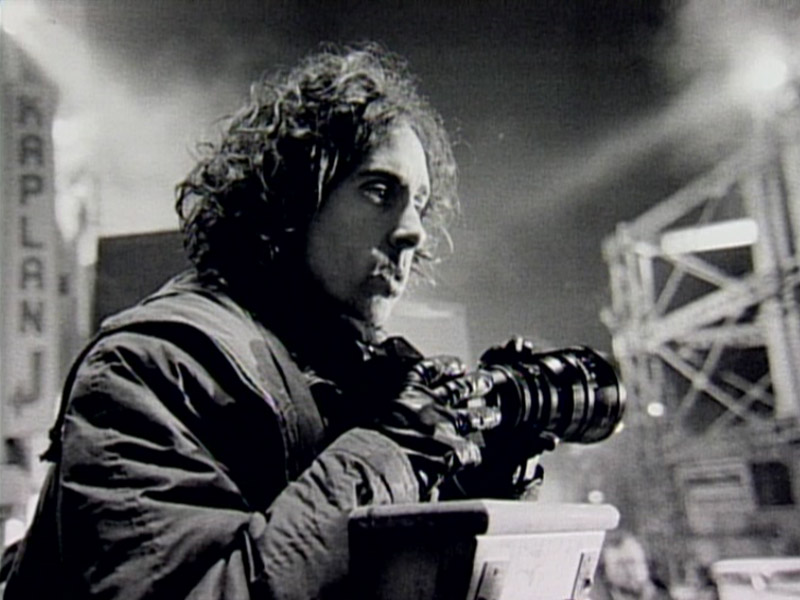 Everybody talks about how there was an uproar over the choice of Michael Keaton as Batman but I'm actually surprised that there wasn't as much of one over the choice of Tim Burton as director. I'm not saying there should have been but when you look at his track record up to that point, I don't know how you would have thought that he would be the best person to be given the reins of a highly anticipated, expensive event movie. At that point, Burton had had some box-office successes under his belt with Pee-Wee's Big Adventure and Beetlejuice, which also should have been a sign to many that he had talent, but I just can't help but wonder if some people were like, "You want the guy who did those movies to direct Batman?" But, needless to say, Burton proved to be a great choice. He was able to bring the dark world of Batman and Gotham City to life very successfully and stay fairly true to the source material (at least, from what I can tell) while still injecting some of his own trademark touches into it. I can safely say that is probably my favorite film from Burton, which I don't think would make him too happy, however, because Burton has gone on record saying that this is the film of his that he has the least emotional attachment to. From what I can tell, he feels that way because the enormous hype that surrounded the movie at the time of its release made it feel like it wasn't really his film, that it was a product of the studio or something like that. He's also said that actually filming the movie was miserable for him and was the worst period of his life. He had to deal with a script that was apparently rewritten constantly throughout filming, with Jon Peters (who, if you know anything about him, is one of the stupidest, most deluded producers to ever live) coming up with a new climax for the film behind Burton's back and forcing the director to film a scene whose ending was a complete mystery to him at the time. With all of these problems that I've read about, I think it's amazing that the movie is as coherent as it is. I also think that it's little doubt as to why Burton's next film was Edward Scissorhands, which I think Burton himself has said is his most personal film. In any case, it's a shame that the experience made Burton feel so distant from Batman because I think he did a real bang-up job with it regardless and basically created the modern popular image of the character as well as the contemporary superhero film.
Everybody talks about how there was an uproar over the choice of Michael Keaton as Batman but I'm actually surprised that there wasn't as much of one over the choice of Tim Burton as director. I'm not saying there should have been but when you look at his track record up to that point, I don't know how you would have thought that he would be the best person to be given the reins of a highly anticipated, expensive event movie. At that point, Burton had had some box-office successes under his belt with Pee-Wee's Big Adventure and Beetlejuice, which also should have been a sign to many that he had talent, but I just can't help but wonder if some people were like, "You want the guy who did those movies to direct Batman?" But, needless to say, Burton proved to be a great choice. He was able to bring the dark world of Batman and Gotham City to life very successfully and stay fairly true to the source material (at least, from what I can tell) while still injecting some of his own trademark touches into it. I can safely say that is probably my favorite film from Burton, which I don't think would make him too happy, however, because Burton has gone on record saying that this is the film of his that he has the least emotional attachment to. From what I can tell, he feels that way because the enormous hype that surrounded the movie at the time of its release made it feel like it wasn't really his film, that it was a product of the studio or something like that. He's also said that actually filming the movie was miserable for him and was the worst period of his life. He had to deal with a script that was apparently rewritten constantly throughout filming, with Jon Peters (who, if you know anything about him, is one of the stupidest, most deluded producers to ever live) coming up with a new climax for the film behind Burton's back and forcing the director to film a scene whose ending was a complete mystery to him at the time. With all of these problems that I've read about, I think it's amazing that the movie is as coherent as it is. I also think that it's little doubt as to why Burton's next film was Edward Scissorhands, which I think Burton himself has said is his most personal film. In any case, it's a shame that the experience made Burton feel so distant from Batman because I think he did a real bang-up job with it regardless and basically created the modern popular image of the character as well as the contemporary superhero film.
 As Batman, Keaton is very much a creature of the night: dark, mysterious, quiet, frightening, stalking his prey from the shadows. Your first actual look at him is such a great image, with him descending in the darkness behind those two muggers who robbed that family at the beginning of the film. When you see him in silhouette like that, he really does look like an enormous bat. Speaking of which, let's talk about the actual suit. I will say right now that this film presents my favorite actual look for Batman, with human musculature sculpted onto the actual bodysuit, the mask with those sharp, pointing ears, and that long flowing cape, the latter of which especially makes him look so awesome when he spreads it outward to intimidate criminals. I also think it makes aesthetic sense for his suit to be completely black (although it looks gray in some lights) instead of dark blue and such since he stalks criminals from the shadows, as well as for the torso to be made up of a lightweight body armor. One thing they've always had minor difficulties with is the fact that you can clearly tell that Keaton (or any actor that plays Batman for that matter) is wearing eye-liner on the exposed areas of skin behind the eye-holes in the mask. They did that because in some costume tests, those parts of the face didn't look quite right without the mascara. It's not a big gripe or anything, mind you, but you can tell that it is there. Another odd thing I've wondered about is why criminals, particularly those muggers, still describe him as a huge, bat-like creature when that bright yellow bat-symbol on his chest and utility belt should tip them off that he is, indeed, human. You could argue that they were scared to death by their encounters with him and traumatized but I still think about that. Also, don't those bright yellow spots stand out against his completely black outfit a little bit? Again, not really a problem, just a little observation.
As Batman, Keaton is very much a creature of the night: dark, mysterious, quiet, frightening, stalking his prey from the shadows. Your first actual look at him is such a great image, with him descending in the darkness behind those two muggers who robbed that family at the beginning of the film. When you see him in silhouette like that, he really does look like an enormous bat. Speaking of which, let's talk about the actual suit. I will say right now that this film presents my favorite actual look for Batman, with human musculature sculpted onto the actual bodysuit, the mask with those sharp, pointing ears, and that long flowing cape, the latter of which especially makes him look so awesome when he spreads it outward to intimidate criminals. I also think it makes aesthetic sense for his suit to be completely black (although it looks gray in some lights) instead of dark blue and such since he stalks criminals from the shadows, as well as for the torso to be made up of a lightweight body armor. One thing they've always had minor difficulties with is the fact that you can clearly tell that Keaton (or any actor that plays Batman for that matter) is wearing eye-liner on the exposed areas of skin behind the eye-holes in the mask. They did that because in some costume tests, those parts of the face didn't look quite right without the mascara. It's not a big gripe or anything, mind you, but you can tell that it is there. Another odd thing I've wondered about is why criminals, particularly those muggers, still describe him as a huge, bat-like creature when that bright yellow bat-symbol on his chest and utility belt should tip them off that he is, indeed, human. You could argue that they were scared to death by their encounters with him and traumatized but I still think about that. Also, don't those bright yellow spots stand out against his completely black outfit a little bit? Again, not really a problem, just a little observation.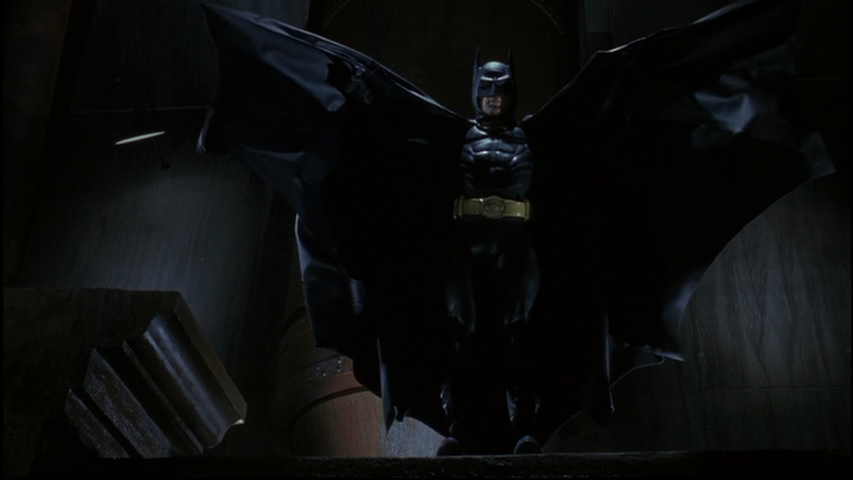
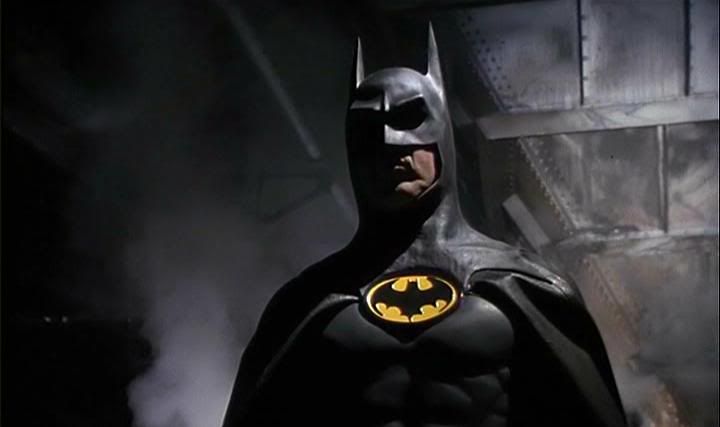
 The way Keaton actually plays Batman also just feels right to me. I'm pretty sure he introduced the idea that, in order to keep people from suspecting him, Bruce Wayne changes his voice considerably when he's in the suit. In any case, I feel that the way he speaks as Batman (which isn't a lot), in that quiet, low whisper, is just perfect and very natural (unlike another actor, who we'll get to at some point). But since he doesn't speak much as Batman, Keaton instead has to use his body language and facial expressions to make himself intimidating and he does that well. He has such a physical presence in how he moves and stands that you believe that this is somebody who is not to be messed with. His facial expressions behind the mask are great as well. I don't think he's scowling so much as he's just genuinely focused and serious on what he's doing. One of my favorite expressions from him is when he enters the bell tower at the end of the movie and he hears the Joker say, "It can be truly said that I have a bat in my belfry." The way he stares into the darkness after hearing that and then just turns back around looks so bad-ass. I also like the little interplay between him and Vicki Vale in the Batmobile when they're driving to the Batcave. When she asks him where they're going, Batman just quickly glances at her and that's it. A moment later, she starts to really look at his face and realize that there's something familiar about it. Batman realizes what she's doing and turns an overhead light on right in her eyes to prevent her from doing so. This continues later on in the Batcave when she keeps trying to get a good look at his face and after constantly turning away from her, he gets up and stands in the shadows while continuing to talk to her. I like little moments like those. Above everything else, Keaton also just simply looks awesome in the suit. People were wondering whether an average-build guy like him could be bought as a tough crime-fighter but once he puts on that suit, you believe that he could beat you in a fight. You could honestly put anyone in that suit and it would look great but Keaton especially just looks right in it. Now, I know that in the fight scenes and stuff, it's a stuntman and not actually Keaton but he still does so much great stuff when it is him that it can't be underestimated. He truly was a great Batman.
The way Keaton actually plays Batman also just feels right to me. I'm pretty sure he introduced the idea that, in order to keep people from suspecting him, Bruce Wayne changes his voice considerably when he's in the suit. In any case, I feel that the way he speaks as Batman (which isn't a lot), in that quiet, low whisper, is just perfect and very natural (unlike another actor, who we'll get to at some point). But since he doesn't speak much as Batman, Keaton instead has to use his body language and facial expressions to make himself intimidating and he does that well. He has such a physical presence in how he moves and stands that you believe that this is somebody who is not to be messed with. His facial expressions behind the mask are great as well. I don't think he's scowling so much as he's just genuinely focused and serious on what he's doing. One of my favorite expressions from him is when he enters the bell tower at the end of the movie and he hears the Joker say, "It can be truly said that I have a bat in my belfry." The way he stares into the darkness after hearing that and then just turns back around looks so bad-ass. I also like the little interplay between him and Vicki Vale in the Batmobile when they're driving to the Batcave. When she asks him where they're going, Batman just quickly glances at her and that's it. A moment later, she starts to really look at his face and realize that there's something familiar about it. Batman realizes what she's doing and turns an overhead light on right in her eyes to prevent her from doing so. This continues later on in the Batcave when she keeps trying to get a good look at his face and after constantly turning away from her, he gets up and stands in the shadows while continuing to talk to her. I like little moments like those. Above everything else, Keaton also just simply looks awesome in the suit. People were wondering whether an average-build guy like him could be bought as a tough crime-fighter but once he puts on that suit, you believe that he could beat you in a fight. You could honestly put anyone in that suit and it would look great but Keaton especially just looks right in it. Now, I know that in the fight scenes and stuff, it's a stuntman and not actually Keaton but he still does so much great stuff when it is him that it can't be underestimated. He truly was a great Batman. 
 A big complaint about the film is that Batman doesn't seem to be the focus and doesn't get as much screentime as the Joker. Technically, that's not entirely true. Michael Keaton is in a lot of the movie, it's just that there are large sections with him as Bruce Wayne, perhaps even more so than when he's Batman. In fact, when I was a little kid, after the big scene at Axis Chemicals, I tended to not pay attention since Batman disappears from the movie for a while and you're left with Bruce Wayne. As a kid, I just wanted to see Batman beating up criminals. But, of course, now as an adult, what fascinates me is that there are many different sides to the Batman character, which are made clear when you watch Michael Keaton play Bruce Wayne. Some may feel that there are simply two sides, Bruce Wayne and Batman, but I actually think there are two sides to Bruce Wayne along with his crime-fighting alter ego. The first side is the one you see when Wayne is socializing with people at his benefit party as well as when he's romancing Vicki Vale. He comes across as very charming and charismatic, complimenting Alexander Knox on his journalism and spending the evening with Vale. But there's also an oddness to him, which is no doubt a result of the other side of Wayne, which we'll get into shortly. When you see him at that benefit party, while he's still charming, he also comes across as more than a little awkward and eccentric about what he's doing. After he meets Vale and watches her walk away, he completely ignores the guy he was writing a check for to the point where that person has to remind him of what he was doing. He then doesn't know what to do with the pen he's stuck with and just sticks it in some decoration and leaves it there, prompting Alfred to pull it out and take it. As if that wasn't enough, he drinks the rest of his champagne and just absent-mindedly puts it on the edge of a craps table and Alfred, again, has to act fast before it falls off and breaks. Later, when he's talking to Vicki Vale and Knox in the room housing his armor collection, a servant (who was that guy, by the way?) asks him if it's okay for them to open some more champagne and he says, "Oh, sure, go ahead. Open... what? Six?" He then turns to Vale and Knox and asks, "Six?" When they agree six is good, he tells the servant to do that. To add even more to their befuddlement, when Alfred motions to him that something important is going on concerning Commissioner Gordon and Wayne quickly excuses himself, he suddenly tells Alfred to give Knox a grant, following up literally on a joke the latter made earlier. After that, Knox comments on how eccentric Wayne is. But I also feel that the reason they don't think about his strangeness being a clue to who he might really be is because it feels natural, not forced or like a put-on. He just seems naturally strange, not like he's trying to hide something.
A big complaint about the film is that Batman doesn't seem to be the focus and doesn't get as much screentime as the Joker. Technically, that's not entirely true. Michael Keaton is in a lot of the movie, it's just that there are large sections with him as Bruce Wayne, perhaps even more so than when he's Batman. In fact, when I was a little kid, after the big scene at Axis Chemicals, I tended to not pay attention since Batman disappears from the movie for a while and you're left with Bruce Wayne. As a kid, I just wanted to see Batman beating up criminals. But, of course, now as an adult, what fascinates me is that there are many different sides to the Batman character, which are made clear when you watch Michael Keaton play Bruce Wayne. Some may feel that there are simply two sides, Bruce Wayne and Batman, but I actually think there are two sides to Bruce Wayne along with his crime-fighting alter ego. The first side is the one you see when Wayne is socializing with people at his benefit party as well as when he's romancing Vicki Vale. He comes across as very charming and charismatic, complimenting Alexander Knox on his journalism and spending the evening with Vale. But there's also an oddness to him, which is no doubt a result of the other side of Wayne, which we'll get into shortly. When you see him at that benefit party, while he's still charming, he also comes across as more than a little awkward and eccentric about what he's doing. After he meets Vale and watches her walk away, he completely ignores the guy he was writing a check for to the point where that person has to remind him of what he was doing. He then doesn't know what to do with the pen he's stuck with and just sticks it in some decoration and leaves it there, prompting Alfred to pull it out and take it. As if that wasn't enough, he drinks the rest of his champagne and just absent-mindedly puts it on the edge of a craps table and Alfred, again, has to act fast before it falls off and breaks. Later, when he's talking to Vicki Vale and Knox in the room housing his armor collection, a servant (who was that guy, by the way?) asks him if it's okay for them to open some more champagne and he says, "Oh, sure, go ahead. Open... what? Six?" He then turns to Vale and Knox and asks, "Six?" When they agree six is good, he tells the servant to do that. To add even more to their befuddlement, when Alfred motions to him that something important is going on concerning Commissioner Gordon and Wayne quickly excuses himself, he suddenly tells Alfred to give Knox a grant, following up literally on a joke the latter made earlier. After that, Knox comments on how eccentric Wayne is. But I also feel that the reason they don't think about his strangeness being a clue to who he might really be is because it feels natural, not forced or like a put-on. He just seems naturally strange, not like he's trying to hide something.
 I see Bruce Wayne's oddness as an outgrowth of his other side, which is the one we see when no one else is around and when he's working in the Batcave. That is the tortured, scarred man who lost his parents at a very young age and has never been able to come to terms with it, which is why he became Batman. I feel that eccentric side comes from his being forced to put on a public face due to his position and wealth, which is a part he doesn't know how to play or cope with due to his mindset. You can see the pain he's going through in the scene where he drops some roses at the alley that you later learn is the spot where his parents were killed and also the anguish and dilemma that Vicki Vale's entering his life is putting him through, with how he avoids her so as not to distract himself from his mission. He does take Alfred's advice at one point and tries to tell her the truth but he just cannot get the words out and just when he's about to, they're interrupted. In fact, it's later in this very scene where you also get a sense that he actually is quite a disturbed human being. When he confronts the Joker after he barges into Vicki's apartment, at one point, he just suddenly snaps, smashing a vase with a fire-poker and screaming, "You wanna get nuts?! Come on! Let's get nuts!" That just comes out of nowhere and is not something you'd expect to see Bruce Wayne, and especially Batman, do because he's always been characterized as being very cool and in control, despite his emotional torture. I, personally, think it adds a bit of reality since someone would end up being a little crazy given those circumstances. Wayne also seems to not know exactly who he is, judging from a conversation he has with Vale about how some of his mansion, "Is very much me... and some of it isn't." You'd think he would be referring to the Batcave as the part that's very much him but he doesn't seem sure himself when he talks to her about it, adding some flame to the argument about whether Bruce Wayne or Batman is the real identity. Finally, after she discovers that he's Batman, he admits to her that sometimes he doesn't know what to think about or how to deal with his alter ego. Bottom line, Bruce Wayne is simply, as Knox says at one point, "very screwed up."
I see Bruce Wayne's oddness as an outgrowth of his other side, which is the one we see when no one else is around and when he's working in the Batcave. That is the tortured, scarred man who lost his parents at a very young age and has never been able to come to terms with it, which is why he became Batman. I feel that eccentric side comes from his being forced to put on a public face due to his position and wealth, which is a part he doesn't know how to play or cope with due to his mindset. You can see the pain he's going through in the scene where he drops some roses at the alley that you later learn is the spot where his parents were killed and also the anguish and dilemma that Vicki Vale's entering his life is putting him through, with how he avoids her so as not to distract himself from his mission. He does take Alfred's advice at one point and tries to tell her the truth but he just cannot get the words out and just when he's about to, they're interrupted. In fact, it's later in this very scene where you also get a sense that he actually is quite a disturbed human being. When he confronts the Joker after he barges into Vicki's apartment, at one point, he just suddenly snaps, smashing a vase with a fire-poker and screaming, "You wanna get nuts?! Come on! Let's get nuts!" That just comes out of nowhere and is not something you'd expect to see Bruce Wayne, and especially Batman, do because he's always been characterized as being very cool and in control, despite his emotional torture. I, personally, think it adds a bit of reality since someone would end up being a little crazy given those circumstances. Wayne also seems to not know exactly who he is, judging from a conversation he has with Vale about how some of his mansion, "Is very much me... and some of it isn't." You'd think he would be referring to the Batcave as the part that's very much him but he doesn't seem sure himself when he talks to her about it, adding some flame to the argument about whether Bruce Wayne or Batman is the real identity. Finally, after she discovers that he's Batman, he admits to her that sometimes he doesn't know what to think about or how to deal with his alter ego. Bottom line, Bruce Wayne is simply, as Knox says at one point, "very screwed up."One final thing I have to say about Batman himself is the issue that in both of the Burton films and even in Batman Forever to an extent, Batman willingly kills some of the criminals he fights. He blows up the Axis Chemicals plant when it's filled with the Joker's thugs and drops another henchman to his death down the bell-tower; hell, in Batman Returns, he places a bomb on a guy's chest and then drops him down a hole right before he blows up. Let's also not forget that he locks onto the Joker with the Batwing's targeting computer and attempts to shoot him down (we'll elaborate on that later). Moreover, when Batman shoots that one crook during the Axis Chemicals sequence with his grappling gun and proceeds to hang him over the bit of railing, as a kid I actually thought he got him right in the neck (it wasn't until I was an adult that I realize he hooked the collar of his suit). And anybody who's seen the movie knows that it's unclear whether Batman intentionally dropped Jack Napier into the vat of chemicals that turned him into the Joker or whether his hand slipped. Batman is quite bloodthirsty in this and some of the other films and a lot of people don't like that because they feel that his doing so lessens his heroic status to a degree and makes him no better than the criminals he's trying to fight, particularly those that killed his parents. For the longest time, I didn't think about that but, now that I do, I do agree with that notion. However, here are some ways I look at it. As pure a person and, in Batman's case, a justice-seeker that you might want to be, sometimes you have no choice but to take someone out. I kind of equate it to how most police officers don't want to use lethal force but sometimes, they have no choice. I will grant you that the smile Batman gave to that guy he put the bomb on in Batman Returns seems a bit sadistic but that leads me to another way of looking at it: you have to keep in mind that, as I said, Bruce Wayne isn't exactly a stable person. He may want to do good but, being human, and with his type of mindset, even he isn't immune to where vengeance can lead you. Finally, there's how Tim Burton's biographer Ken Hanke described it: being a person who's dealing with emotional trauma, Batman could be seen as more as an anti-hero, one who has to push the boundaries of justice in order to deal with some criminals. He's, first and foremost, a vigilante, someone who's not exactly in line with actual law enforcement, which is corrupt in Gotham anyway. So, yeah, I do agree with the notion of why Batman shouldn't kill people but that's how I rationalize this interpretation of the character doing so. (I do have an issue with him doing so in Batman Forever, though, which we'll eventually get to.)
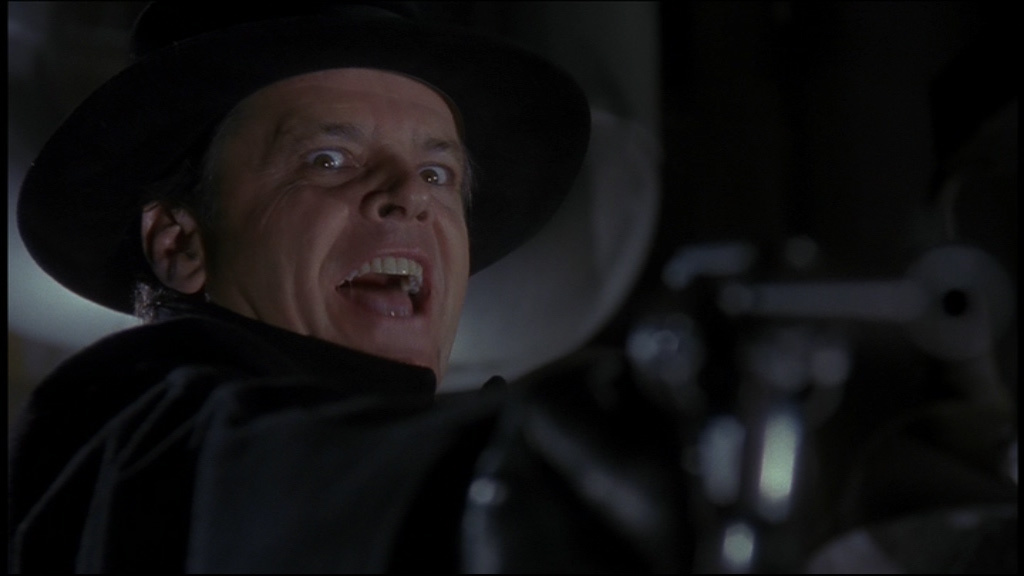 Most people complain about the Joker stealing the show away from Batman but all I can say is that's what happens when you let Jack Nicholson loose, as Tim Burton did. During this entire film, you can just tell that Nicholson is having an absolute ball in chewing the scenery to his heart's content, that he waits for these opportunities to be so over the top. He's so entertaining to watch in this film as well that, while he may indeed steal the spotlight from the title character, I really don't care. He doesn't start out that over the top, though. Before he becomes the Joker, he's Jack Napier, the sadistic and cruel enforcer of Carl Grissom, the crime lord who basically runs Gotham City. He's actually far more chilling here than when he becomes the Joker because as Jack Napier, he's very subdued and cold in his evil, coming across as a true psychopath who's been given the position of running a city for a crime lord. When he threatens Lt. Eckhardt, you just know he could kill this bad cop right there in a very sadistic, painful way and not even bat an eyelash with the way he talks to him and sneers at him. That evil chuckle he gives at the end of that scene is particularly creepy. The basic idea with the character is that he's already an evil, psychotic man and his being dumped into the vat of chemicals not only physically changes him into the Joker but also bring out the insane beast that lies within him full force.
Most people complain about the Joker stealing the show away from Batman but all I can say is that's what happens when you let Jack Nicholson loose, as Tim Burton did. During this entire film, you can just tell that Nicholson is having an absolute ball in chewing the scenery to his heart's content, that he waits for these opportunities to be so over the top. He's so entertaining to watch in this film as well that, while he may indeed steal the spotlight from the title character, I really don't care. He doesn't start out that over the top, though. Before he becomes the Joker, he's Jack Napier, the sadistic and cruel enforcer of Carl Grissom, the crime lord who basically runs Gotham City. He's actually far more chilling here than when he becomes the Joker because as Jack Napier, he's very subdued and cold in his evil, coming across as a true psychopath who's been given the position of running a city for a crime lord. When he threatens Lt. Eckhardt, you just know he could kill this bad cop right there in a very sadistic, painful way and not even bat an eyelash with the way he talks to him and sneers at him. That evil chuckle he gives at the end of that scene is particularly creepy. The basic idea with the character is that he's already an evil, psychotic man and his being dumped into the vat of chemicals not only physically changes him into the Joker but also bring out the insane beast that lies within him full force. The Joker's motivations may seem very askew (as it usually is with him) but when you think about it, he's simply following up on his previous ambitions to take over Grissom's organization and rule the city, which he revealed to his lover by saying, "He's a tired old man. He can't run this city without me." The only thing that's changed are his methods. Having been driven completely insane by the exposure to the chemicals, he decides to spread that same insanity throughout Gotham City by poisoning various citizens with his deadly madness-inducing chemicals. Interesting enough, his plan to gas the entire city at the end of the movie is aided by the fact that most of the people in Gotham City are the greediest and stupidest people imaginable. I know he promised to dump $20 million on the crowd at the festival but you'd think the people would know better than to trust a clown-faced madman who has already killed a lot of people! What's also funny about the Joker's plan is that he wants everybody to know who he is as well, and is jealous whenever Batman steals all of his attention, saying, "Can somebody tell me what kind of a world we live in where a man dressed up as a bat gets all of my press?" After it's revealed to the press that Batman has figured out the code to the poison he's spreading through Gotham, he speaks the great line, "I have given a name to my pain and it is Batman." Batman is now truly his enemy. He especially gets mad during the parade near the end of the movie when Batman uses the Batwing to scoop up his gas-spewing balloons and takes it out on Bob for some reason by killing him. His hatred for Batman is cranked up even more when he gets the hots for Vicki Vale and Batman saves her from him at the museum. It's like a weird love triangle, although the Joker is more than willing to let Vicki fall to her death off the cathedral with Batman at the end of the movie.
The Joker's motivations may seem very askew (as it usually is with him) but when you think about it, he's simply following up on his previous ambitions to take over Grissom's organization and rule the city, which he revealed to his lover by saying, "He's a tired old man. He can't run this city without me." The only thing that's changed are his methods. Having been driven completely insane by the exposure to the chemicals, he decides to spread that same insanity throughout Gotham City by poisoning various citizens with his deadly madness-inducing chemicals. Interesting enough, his plan to gas the entire city at the end of the movie is aided by the fact that most of the people in Gotham City are the greediest and stupidest people imaginable. I know he promised to dump $20 million on the crowd at the festival but you'd think the people would know better than to trust a clown-faced madman who has already killed a lot of people! What's also funny about the Joker's plan is that he wants everybody to know who he is as well, and is jealous whenever Batman steals all of his attention, saying, "Can somebody tell me what kind of a world we live in where a man dressed up as a bat gets all of my press?" After it's revealed to the press that Batman has figured out the code to the poison he's spreading through Gotham, he speaks the great line, "I have given a name to my pain and it is Batman." Batman is now truly his enemy. He especially gets mad during the parade near the end of the movie when Batman uses the Batwing to scoop up his gas-spewing balloons and takes it out on Bob for some reason by killing him. His hatred for Batman is cranked up even more when he gets the hots for Vicki Vale and Batman saves her from him at the museum. It's like a weird love triangle, although the Joker is more than willing to let Vicki fall to her death off the cathedral with Batman at the end of the movie.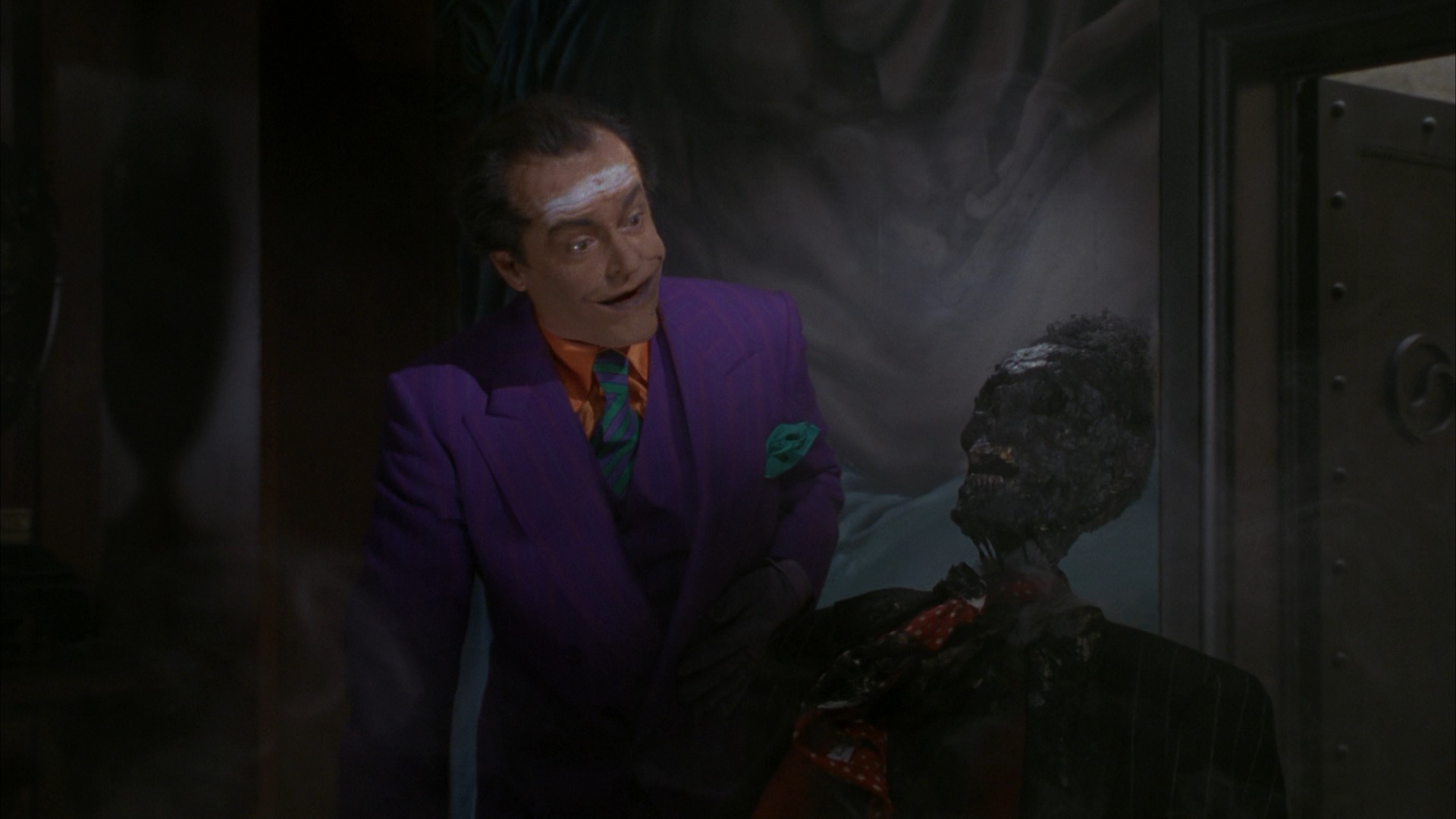
 As I said, the Joker (as he's often portrayed nowadays) is both disturbingly sadistic and cruel in his insanity but is also very funny at the same time. Ironically, he's the most colorful and energetic character in the film both literally and emotionally. The biggest example of this comes during his meeting with Grissom's associates. When one of them isn't too fond of him taking control of the organization, the Joker uses a deadly electric buzzer to fry the guy to death. It's so bizarre in that this guy is getting burned alive and is eventually fried down to a charred skeleton and yet the whole time, the Joker is absolutely hysterical in what he's saying: "Whoo! Whoo! Oh, I got a live one here! Oh, there'll be a hot time in the old town tonight!" After the guy is dead, one of the gangsters calls him out on how insane he is and the Joker simply says, "Haven't you ever heard of the healing power of laughter?" It goes on after everyone leaves and the Joker is left alone with that guy's fried corpse, talking to it and acting like it's talking back. It ends with him saying, "You are a vicious bastard, Rotelli, and," he straightens the corpse's tie with a sickening crack, "I'm glad you're dead!" He leaves the room, laughing hysterically, while the camera lingers on the steaming corpse. Also, the Joker spreads a poison throughout Gotham City that causes people to die with this hideous grin on their face after laughing hysterically and just to frighten the city's people even more, the Joker sends out this commercial that advertizes the very poison! Think about that statement he makes where he says, "I know what you're saying: 'Where can I find this great new items?' Well, that's the gag. Chances are you bought them already!" That is both horrifying and very darkly funny! It's that kind of bizarre, freaky quirkiness and dark humor that only Tim Burton can do and, surprisingly, works for a dark comic book like Batman. Of course, there's also stuff that's just plain comedic, like the Joker and his minions trashing the art museum while dancing to the song Partyman by Prince that's playing on the radio (that moment where the Joker imitates the stance of one of those statues cracks me up every time), his later saying to Vicki Vale that he wants his face on the one dollar bill, and the schtick he goes through during the final fight with Batman, using a pop-gun to scare Vicki Vale half to death and spitting out some wind-up chattering teeth after Batman punches him in the face (when I was little, I thought those really were his teeth!) His line to Vicki Vale about them being Beauty and the Beast and his adding, "Of course, if anyone else calls you beast, I'll rip their lungs out" always makes me smile, as well as when he's laughing like crazy and goofing around while Batman and Vicki Vale are hanging onto the edge of the cathedral. Finally, the Joker just looks weird and funny when he puts on that flesh-colored makeup to hide the fact that his skin is stained white. The guy he fries in the boardroom asks him why he has that silly (and unknown to him, permanent) grin on his face and he simply says, "Life's been good to me." How can you not love that?
As I said, the Joker (as he's often portrayed nowadays) is both disturbingly sadistic and cruel in his insanity but is also very funny at the same time. Ironically, he's the most colorful and energetic character in the film both literally and emotionally. The biggest example of this comes during his meeting with Grissom's associates. When one of them isn't too fond of him taking control of the organization, the Joker uses a deadly electric buzzer to fry the guy to death. It's so bizarre in that this guy is getting burned alive and is eventually fried down to a charred skeleton and yet the whole time, the Joker is absolutely hysterical in what he's saying: "Whoo! Whoo! Oh, I got a live one here! Oh, there'll be a hot time in the old town tonight!" After the guy is dead, one of the gangsters calls him out on how insane he is and the Joker simply says, "Haven't you ever heard of the healing power of laughter?" It goes on after everyone leaves and the Joker is left alone with that guy's fried corpse, talking to it and acting like it's talking back. It ends with him saying, "You are a vicious bastard, Rotelli, and," he straightens the corpse's tie with a sickening crack, "I'm glad you're dead!" He leaves the room, laughing hysterically, while the camera lingers on the steaming corpse. Also, the Joker spreads a poison throughout Gotham City that causes people to die with this hideous grin on their face after laughing hysterically and just to frighten the city's people even more, the Joker sends out this commercial that advertizes the very poison! Think about that statement he makes where he says, "I know what you're saying: 'Where can I find this great new items?' Well, that's the gag. Chances are you bought them already!" That is both horrifying and very darkly funny! It's that kind of bizarre, freaky quirkiness and dark humor that only Tim Burton can do and, surprisingly, works for a dark comic book like Batman. Of course, there's also stuff that's just plain comedic, like the Joker and his minions trashing the art museum while dancing to the song Partyman by Prince that's playing on the radio (that moment where the Joker imitates the stance of one of those statues cracks me up every time), his later saying to Vicki Vale that he wants his face on the one dollar bill, and the schtick he goes through during the final fight with Batman, using a pop-gun to scare Vicki Vale half to death and spitting out some wind-up chattering teeth after Batman punches him in the face (when I was little, I thought those really were his teeth!) His line to Vicki Vale about them being Beauty and the Beast and his adding, "Of course, if anyone else calls you beast, I'll rip their lungs out" always makes me smile, as well as when he's laughing like crazy and goofing around while Batman and Vicki Vale are hanging onto the edge of the cathedral. Finally, the Joker just looks weird and funny when he puts on that flesh-colored makeup to hide the fact that his skin is stained white. The guy he fries in the boardroom asks him why he has that silly (and unknown to him, permanent) grin on his face and he simply says, "Life's been good to me." How can you not love that? 
 There's a very fascinating and interesting relationship between Batman and the Joker in this film if you stop to think about it. Tim Burton himself described the movie as a, "complete duel of the freaks; a fight between two disturbed people." Critic Kim Newman went even further to say that the two characters are entwined with each other, which is true. In this interpretation of Batman's origin, a young Jack Napier is the criminal who guns down Bruce Wayne's parents right in front of the young boy. That, of course, is the motivation for Bruce Wayne eventually becoming Batman, who eventually drops (intentionally or not) Jack into the chemicals that turns him into the Joker. The two of them created each other, with the Joker telling Batman he made him and Batman clarifying, "You killed my parents. I made you, you made me first." On top of this, the two of them constantly confront each other throughout the film and each of their dual personalities meet the other at least once. Bruce Wayne and Jack Napier first met each other when Jack killed his parents. The first confrontation during the film's actual story is between Batman and Jack Napier in the Axis Chemicals plant. Although neither of them realize it at that point, it's the first meeting of the creator (Jack) and the creation (Batman). After that, there's the confrontation between Bruce Wayne and the Joker in Vicki Vale's apartment. Bruce is not only interacting with the creature his alter ego created but also with the man who created said alter ego. And then finally, during the climax in the bell-tower, the two creations meet each other and realize the role they both played in having it all come to this point. (Oddly, the Joker seems to know that Batman is Bruce Wayne, even though there was nothing that should have tipped him off but I guess you could say he instantly knew once Batman told him he killed his parents.) Interestingly, for a long time, I thought Bruce Wayne knew all along that Jack Napier was his parents' murderer, which is why, as Batman, he singled Jack out during the Axis Chemicals scene. Bruce's reaction to the Joker saying to him, "You ever danced with the devil in the pale moonlight?", the line he said to him after killing his parents, should have tipped me off but for the longest time, it didn't hit me. In any case, you can also see them as two sides of the same coin. They're both emotionally scarred, with one using his scarring to help others while the other uses it to further his own selfish and evil purposes. Finally, I've heard some complaints that Batman tracking down and defeating the one who killed parents would give him some emotional closure, something that is not at all good for the story and especially for the citizens of Gotham City. For me, you can look at it two ways. Maybe even after dealing with his parents' murderer, Batman still considers himself to be Gotham City's protector and thus, continues his war on crime. Or you could look at it as he still is scarred and continues to fight crime for his own peace of mind, something that Batman Forever later addresses. Either way, I don't see any reason why Batman wouldn't still protect the city even after defeating the one who destroyed his life.
There's a very fascinating and interesting relationship between Batman and the Joker in this film if you stop to think about it. Tim Burton himself described the movie as a, "complete duel of the freaks; a fight between two disturbed people." Critic Kim Newman went even further to say that the two characters are entwined with each other, which is true. In this interpretation of Batman's origin, a young Jack Napier is the criminal who guns down Bruce Wayne's parents right in front of the young boy. That, of course, is the motivation for Bruce Wayne eventually becoming Batman, who eventually drops (intentionally or not) Jack into the chemicals that turns him into the Joker. The two of them created each other, with the Joker telling Batman he made him and Batman clarifying, "You killed my parents. I made you, you made me first." On top of this, the two of them constantly confront each other throughout the film and each of their dual personalities meet the other at least once. Bruce Wayne and Jack Napier first met each other when Jack killed his parents. The first confrontation during the film's actual story is between Batman and Jack Napier in the Axis Chemicals plant. Although neither of them realize it at that point, it's the first meeting of the creator (Jack) and the creation (Batman). After that, there's the confrontation between Bruce Wayne and the Joker in Vicki Vale's apartment. Bruce is not only interacting with the creature his alter ego created but also with the man who created said alter ego. And then finally, during the climax in the bell-tower, the two creations meet each other and realize the role they both played in having it all come to this point. (Oddly, the Joker seems to know that Batman is Bruce Wayne, even though there was nothing that should have tipped him off but I guess you could say he instantly knew once Batman told him he killed his parents.) Interestingly, for a long time, I thought Bruce Wayne knew all along that Jack Napier was his parents' murderer, which is why, as Batman, he singled Jack out during the Axis Chemicals scene. Bruce's reaction to the Joker saying to him, "You ever danced with the devil in the pale moonlight?", the line he said to him after killing his parents, should have tipped me off but for the longest time, it didn't hit me. In any case, you can also see them as two sides of the same coin. They're both emotionally scarred, with one using his scarring to help others while the other uses it to further his own selfish and evil purposes. Finally, I've heard some complaints that Batman tracking down and defeating the one who killed parents would give him some emotional closure, something that is not at all good for the story and especially for the citizens of Gotham City. For me, you can look at it two ways. Maybe even after dealing with his parents' murderer, Batman still considers himself to be Gotham City's protector and thus, continues his war on crime. Or you could look at it as he still is scarred and continues to fight crime for his own peace of mind, something that Batman Forever later addresses. Either way, I don't see any reason why Batman wouldn't still protect the city even after defeating the one who destroyed his life.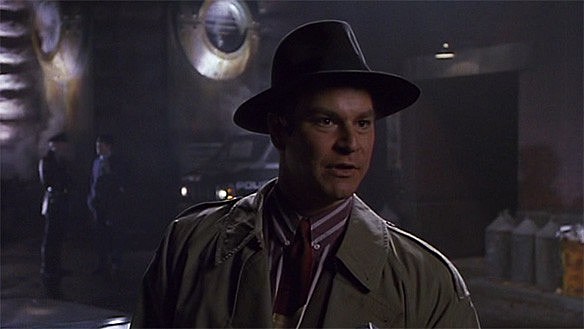 One character I wish they had continued with in the other movies is Robert Wuhl as reporter Alexander Knox. I really like this guy. He's funny and witty, does whatever he can to get a story but doesn't go overboard to the point where he comes across as a jerk, being rather easygoing for the most part. When his fellow reporters are giving him a hard time for wasting his time on the Batman story, he doesn't go off on them. Instead, he remains confident that he's onto something big and when someone gives him a fake drawing of Batman just to annoy him, he simply quips, "Very cute. Should have a little more gore under the fangs, though, huh? What a dick." He does not care that his peers think he's an idiot for pursuing this story. He knows he's onto something awesome and doesn't let them destroy his confidence. I also like his remarks when he's trying to get information out of people, like when he says to Lt. Eckhardt, "Is there a six-foot bat in Gotham City? And if so, is he on the police payroll? And if so, what's he pulling down, after taxes?" Another moment of his I like is when he and some other reporters are talking to the gangsters, including one man who claims that Carl Grissom has appointed him to take control of his businesses for the time being. Knox quips, "That's a pretty big favor. You guys must have been very close. Did you do a little time together as children?" On top of that, Knox is also a decent guy. At first, he's smitten with Vicki Vale simply because of her looks but grows to actually care about her and gets concerned when she seems to become more interested in Bruce Wayne, whom he sees as an upper-crust weirdo, than their story. At first, that latter part is basically him being jealous but, as I said, it grows sincere after a while. Knox even attempts to be a hero during the parade sequence in the climax, getting a baseball and gas mask and attempting to stop the Joker's thugs from helping him gas the city. In fact, Knox was supposed to die a hero at this point but Wuhl had done such a good job at making him likable that they decided to let him live. That's why I'm disappointed that he didn't appear in any of the other movies. He could have become a great supporting character throughout the films. There is a very minor reporter character in Batman Returns who acts a little bit like Knox (played by a different person, though) but other than that, Knox disappears from the universe completely after this film. I personally like to think he got tired of the corruption in Gotham and moved somewhere more peaceful.
One character I wish they had continued with in the other movies is Robert Wuhl as reporter Alexander Knox. I really like this guy. He's funny and witty, does whatever he can to get a story but doesn't go overboard to the point where he comes across as a jerk, being rather easygoing for the most part. When his fellow reporters are giving him a hard time for wasting his time on the Batman story, he doesn't go off on them. Instead, he remains confident that he's onto something big and when someone gives him a fake drawing of Batman just to annoy him, he simply quips, "Very cute. Should have a little more gore under the fangs, though, huh? What a dick." He does not care that his peers think he's an idiot for pursuing this story. He knows he's onto something awesome and doesn't let them destroy his confidence. I also like his remarks when he's trying to get information out of people, like when he says to Lt. Eckhardt, "Is there a six-foot bat in Gotham City? And if so, is he on the police payroll? And if so, what's he pulling down, after taxes?" Another moment of his I like is when he and some other reporters are talking to the gangsters, including one man who claims that Carl Grissom has appointed him to take control of his businesses for the time being. Knox quips, "That's a pretty big favor. You guys must have been very close. Did you do a little time together as children?" On top of that, Knox is also a decent guy. At first, he's smitten with Vicki Vale simply because of her looks but grows to actually care about her and gets concerned when she seems to become more interested in Bruce Wayne, whom he sees as an upper-crust weirdo, than their story. At first, that latter part is basically him being jealous but, as I said, it grows sincere after a while. Knox even attempts to be a hero during the parade sequence in the climax, getting a baseball and gas mask and attempting to stop the Joker's thugs from helping him gas the city. In fact, Knox was supposed to die a hero at this point but Wuhl had done such a good job at making him likable that they decided to let him live. That's why I'm disappointed that he didn't appear in any of the other movies. He could have become a great supporting character throughout the films. There is a very minor reporter character in Batman Returns who acts a little bit like Knox (played by a different person, though) but other than that, Knox disappears from the universe completely after this film. I personally like to think he got tired of the corruption in Gotham and moved somewhere more peaceful. 
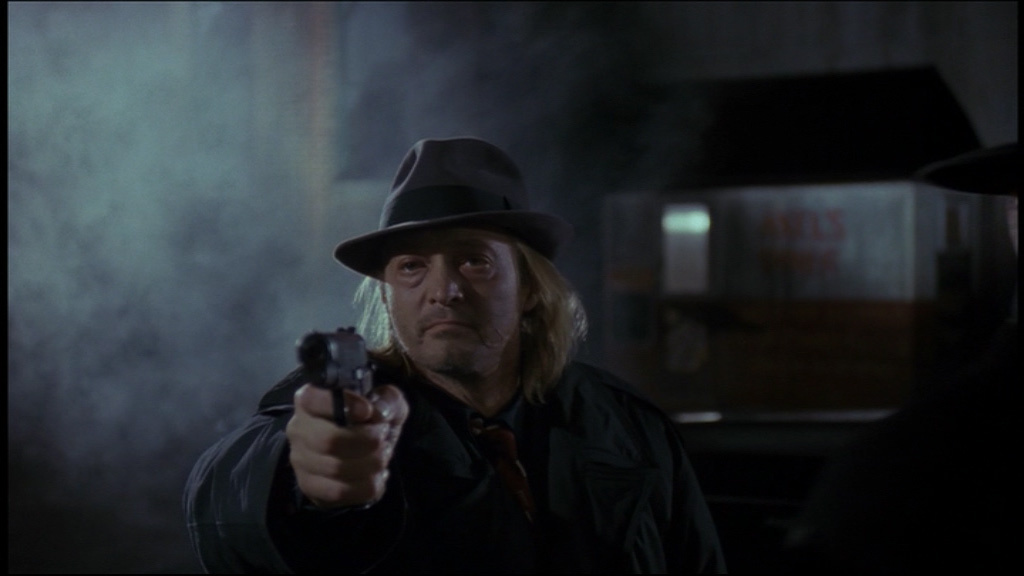
 Most of the Joker's goons are faceless, no name characters but the one that stands out is Bob (Tracey Walter). He doesn't say or do much but, even before Jack Napier becomes the Joker, you can sense a lot of respect and devotion that he has towards his boss. When Jack is threatened by Lt. Eckhardt early in the film, Bob pops up behind Jack and points his pistol at him, protecting his leader and, possibly, friend since he's the only one who calls him "Jack." In fact, I've always wondered how long the two men have known each other. I thought maybe he was the man with Jack in the flashback when he killed Bruce Wayne's parents. I know that guy doesn't look anything like Tracey Walter but I thought it would be interesting that Jack and Bob had known each other for that long. In any case, Bob simply follows the Joker's every whim and order, never questions him, and is just as loyal a henchman as you can get. And how is he repaid for his loyalty? Gets shot for no reason by the Joker. We should have seen it coming since the Joker said the same thing to Bob that Grissom said to him. As for why he did it, with the Joker, you're never exactly sure. Like I said earlier, I think he did it because Bob was supposed to learn everything about Batman by following Alexander Knox around but he didn't learn about the Batwing, which made the Joker yell, "Why didn't somebody tell me that he had one of those things?" Or the Joker could have just shot him to have a minute alone, as he tells his other men after killing Bob. Who knows? The last character I'll mention is the late William Hootkins as the corrupt cop, Lt. Eckhardt. He's a just sleazy, nasty character who works for Grissom despite his position, tipping the mob boss off and making it impossible for the police to arrest him. Commissioner Gordon is also aware that he works for Grissom but the reason he's still a part of the force is probably because he can't prove it. He also does not like Jack Napier at all, telling him that he will never be in charge of Grissom's organization because Grissom knows how deranged he is. It's also implied that he's the one who tipped Grissom off that Jack was having an affair with Alicia due to his line, "Where you spending your nights?" I always thought Grissom just found out himself but after thinking about it, maybe that line was an implication. In any case, Grissom gives Eckhardt the job of killing Jack in a set up sting operation, which eventually leads to him being shot dead by Jack.
Most of the Joker's goons are faceless, no name characters but the one that stands out is Bob (Tracey Walter). He doesn't say or do much but, even before Jack Napier becomes the Joker, you can sense a lot of respect and devotion that he has towards his boss. When Jack is threatened by Lt. Eckhardt early in the film, Bob pops up behind Jack and points his pistol at him, protecting his leader and, possibly, friend since he's the only one who calls him "Jack." In fact, I've always wondered how long the two men have known each other. I thought maybe he was the man with Jack in the flashback when he killed Bruce Wayne's parents. I know that guy doesn't look anything like Tracey Walter but I thought it would be interesting that Jack and Bob had known each other for that long. In any case, Bob simply follows the Joker's every whim and order, never questions him, and is just as loyal a henchman as you can get. And how is he repaid for his loyalty? Gets shot for no reason by the Joker. We should have seen it coming since the Joker said the same thing to Bob that Grissom said to him. As for why he did it, with the Joker, you're never exactly sure. Like I said earlier, I think he did it because Bob was supposed to learn everything about Batman by following Alexander Knox around but he didn't learn about the Batwing, which made the Joker yell, "Why didn't somebody tell me that he had one of those things?" Or the Joker could have just shot him to have a minute alone, as he tells his other men after killing Bob. Who knows? The last character I'll mention is the late William Hootkins as the corrupt cop, Lt. Eckhardt. He's a just sleazy, nasty character who works for Grissom despite his position, tipping the mob boss off and making it impossible for the police to arrest him. Commissioner Gordon is also aware that he works for Grissom but the reason he's still a part of the force is probably because he can't prove it. He also does not like Jack Napier at all, telling him that he will never be in charge of Grissom's organization because Grissom knows how deranged he is. It's also implied that he's the one who tipped Grissom off that Jack was having an affair with Alicia due to his line, "Where you spending your nights?" I always thought Grissom just found out himself but after thinking about it, maybe that line was an implication. In any case, Grissom gives Eckhardt the job of killing Jack in a set up sting operation, which eventually leads to him being shot dead by Jack.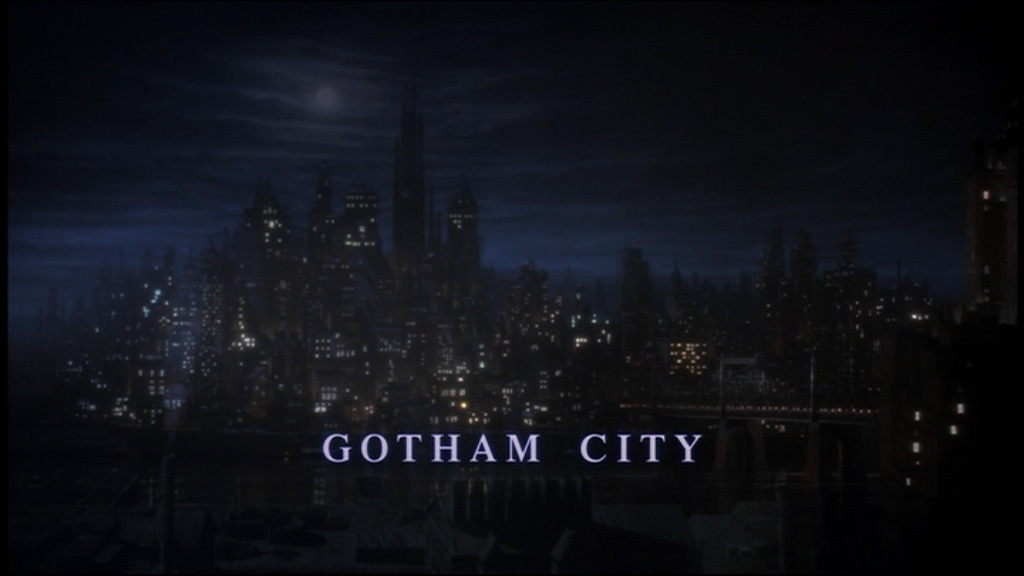


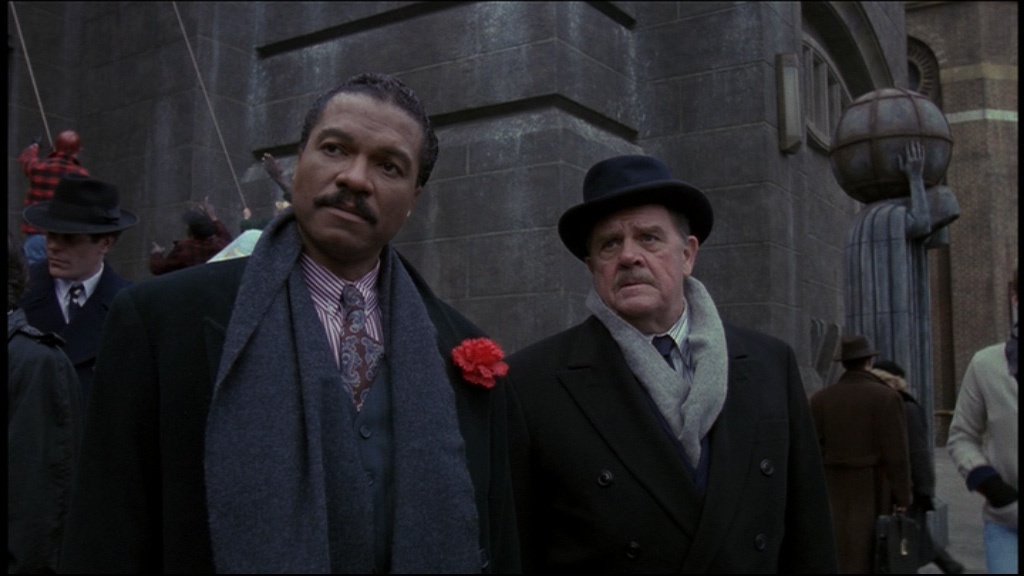 Whether you like Tim Burton's way of making movies or not, one thing you can't deny is his ability to create fully realized worlds that feel all their own in design and atmosphere. The portrayal of Gotham City in Batman is definitely no exception. Even Roger Ebert, who didn't exactly like the film, couldn't help but admire the city, saying it was one of the most atmospheric movie settings he had ever seen. The Academy, as well, took notice, with art directors Anton Furst and Peter Young winning an Oscar for their great work. There are many reasons why Gotham works. First, there are hardly any references to the rest of the world. If it weren't for the very first shot of the movie, showing the city with a bridge leading to it, references to America (Mayor Borg's line, "Across this nation, the words Gotham City are synonymous with crime,") and other countries like Japan, and the American flag inside various government offices, it wouldn't be too far-fetched to think that Gotham City exists in its own little world and time-period. As far as the latter goes, it kind of does. It's both of the time the movie was filmed and yet, not of that time. The design and look of the film echoes 1930's and 40's gangster and noir films as well as pulp magazines. All of the men wear tweed, 40's style suits and coats as well as hats when outside, white cotton business-suit shirts when inside, and Vicki Vale herself dresses very similar to the way women back in that time period did. You also can't tell me that you don't think of the old gangster movies that James Cagney did when you see Jack Napier's gang and the striped suits that they wear. The buildings, alleys, and streets look fairly old-fashioned as well. If you didn't know any better, you'd think this movie was set back when the first Batman comics were published. However, there's also a mixture of more modern pieces like everybody watches televisions that were typical around 1989, the vehicles look pretty modern, and I do see some people here and there that are dressed in modern clothes, like the men working at a construction site in that one brief shot. Also, I don't think Batman could have invented all the highly advanced vehicles and equipment that he has in this movie back in the 30's. Of course, the Prince songs are what let you know the film was made in the 80's but I'll get into those later.
Whether you like Tim Burton's way of making movies or not, one thing you can't deny is his ability to create fully realized worlds that feel all their own in design and atmosphere. The portrayal of Gotham City in Batman is definitely no exception. Even Roger Ebert, who didn't exactly like the film, couldn't help but admire the city, saying it was one of the most atmospheric movie settings he had ever seen. The Academy, as well, took notice, with art directors Anton Furst and Peter Young winning an Oscar for their great work. There are many reasons why Gotham works. First, there are hardly any references to the rest of the world. If it weren't for the very first shot of the movie, showing the city with a bridge leading to it, references to America (Mayor Borg's line, "Across this nation, the words Gotham City are synonymous with crime,") and other countries like Japan, and the American flag inside various government offices, it wouldn't be too far-fetched to think that Gotham City exists in its own little world and time-period. As far as the latter goes, it kind of does. It's both of the time the movie was filmed and yet, not of that time. The design and look of the film echoes 1930's and 40's gangster and noir films as well as pulp magazines. All of the men wear tweed, 40's style suits and coats as well as hats when outside, white cotton business-suit shirts when inside, and Vicki Vale herself dresses very similar to the way women back in that time period did. You also can't tell me that you don't think of the old gangster movies that James Cagney did when you see Jack Napier's gang and the striped suits that they wear. The buildings, alleys, and streets look fairly old-fashioned as well. If you didn't know any better, you'd think this movie was set back when the first Batman comics were published. However, there's also a mixture of more modern pieces like everybody watches televisions that were typical around 1989, the vehicles look pretty modern, and I do see some people here and there that are dressed in modern clothes, like the men working at a construction site in that one brief shot. Also, I don't think Batman could have invented all the highly advanced vehicles and equipment that he has in this movie back in the 30's. Of course, the Prince songs are what let you know the film was made in the 80's but I'll get into those later.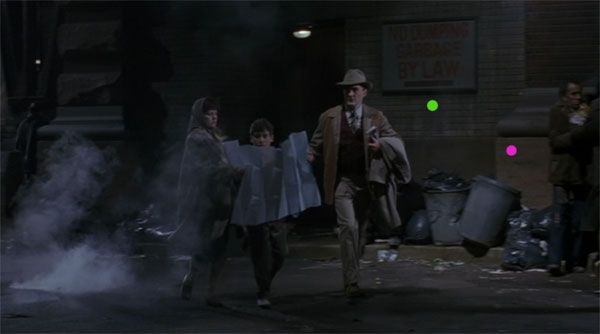

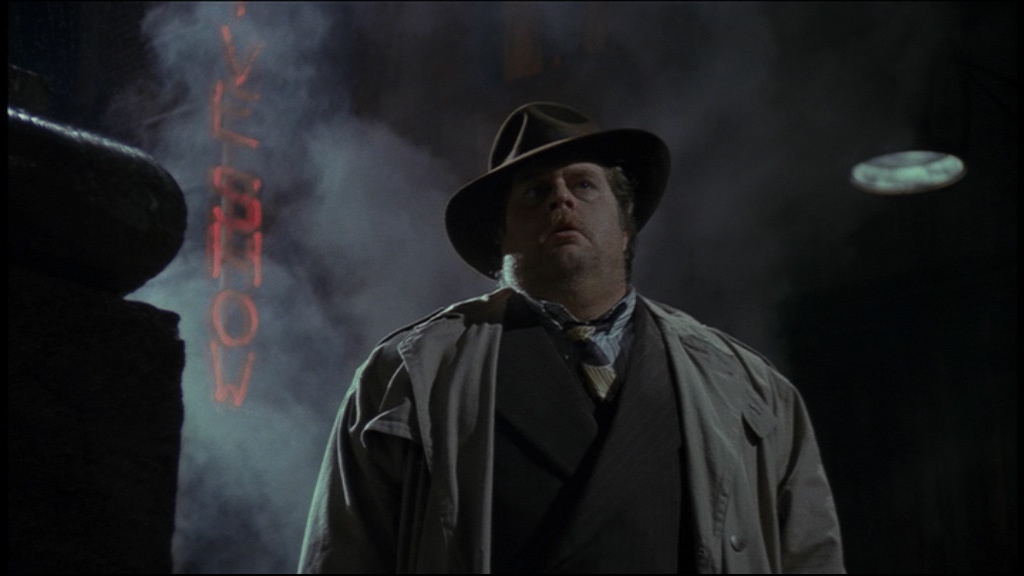 Besides its old-fashioned look, Gotham City also just has a real feeling of menace about it due to its atmosphere. The dark alleyways, rundown streets and side-corners, the neon lights and signs on the sides of some buildings, and the enormous amount of steam flowing from the sewer vents make the city feel like a place that you wouldn't want to walk through by yourself at night. The muggers that rob the family at the beginning of the film and the rather unsavory-looking people who hang out along the streets and sidewalks just add to the feeling that there's danger around every corner. The notion of a police force with corrupt cops, some citizens who are insensitive and cruel enough to take a taxi cab from some vacationing people who got to it first, and the hooker that tries to hit on the young kid of that couple at the beginning of the film (shivers) lend themselves to showing you how ugly and rotten this place is. Finally, I don't know if anyone picks up on this, but it seems like it's a physically unpleasant city to be in as well as emotionally. What I mean by that is that you can tell from how everybody's dressed when they're outside as well as how you can see the actors' breath that it's extremely cold there as well. That may have happened just because they happened to be filming in England in winter but it just adds an extra subtle touch of unpleasantness to the film.
Besides its old-fashioned look, Gotham City also just has a real feeling of menace about it due to its atmosphere. The dark alleyways, rundown streets and side-corners, the neon lights and signs on the sides of some buildings, and the enormous amount of steam flowing from the sewer vents make the city feel like a place that you wouldn't want to walk through by yourself at night. The muggers that rob the family at the beginning of the film and the rather unsavory-looking people who hang out along the streets and sidewalks just add to the feeling that there's danger around every corner. The notion of a police force with corrupt cops, some citizens who are insensitive and cruel enough to take a taxi cab from some vacationing people who got to it first, and the hooker that tries to hit on the young kid of that couple at the beginning of the film (shivers) lend themselves to showing you how ugly and rotten this place is. Finally, I don't know if anyone picks up on this, but it seems like it's a physically unpleasant city to be in as well as emotionally. What I mean by that is that you can tell from how everybody's dressed when they're outside as well as how you can see the actors' breath that it's extremely cold there as well. That may have happened just because they happened to be filming in England in winter but it just adds an extra subtle touch of unpleasantness to the film.


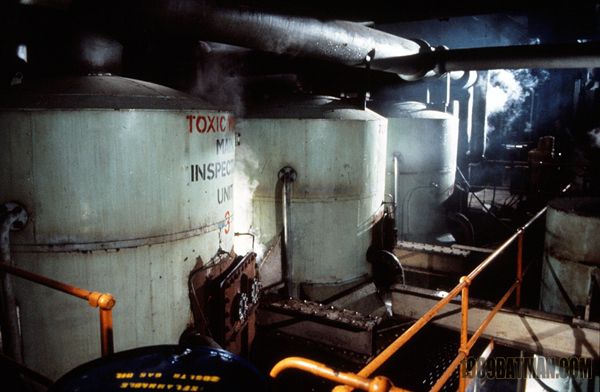

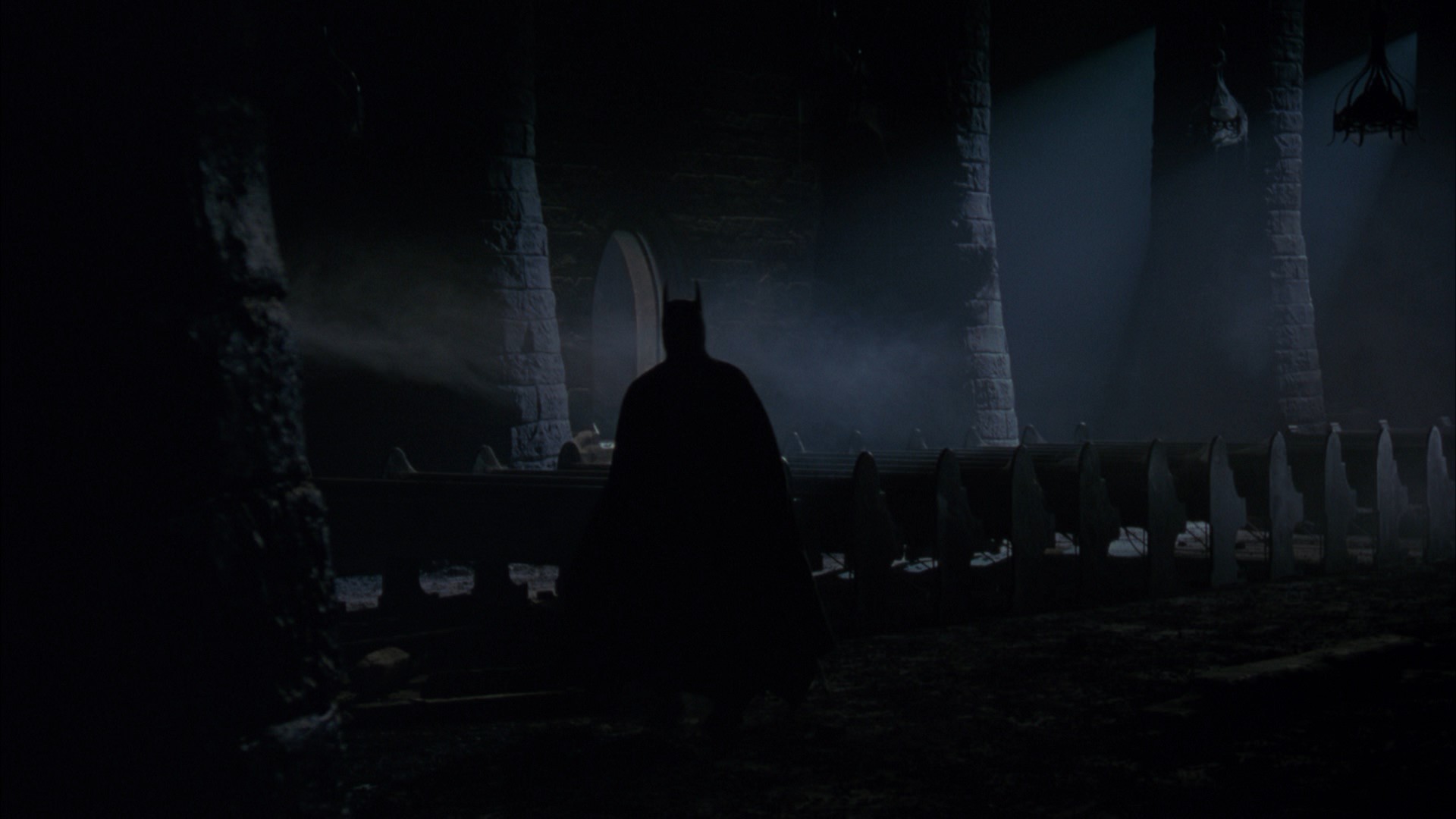 There are other pieces of set design to talk about besides the city itself. The offices of the newspaper where Alexander Knox works is the interior that reminds me the most of a 1940's era film. It just looks like what you've seen in all of those movies, reminding me a bit of the Daily Planet from the Superman universe. Bruce Wayne's mansion looks really cool: very big and lavish, with cool rooms like the armory and that dining room with the mile-long table. I don't know why but as a little kid, I always liked it when they're having that benefit party at the mansion at the beginning and people are playing roulette and craps and the like. I guess it was because at that young age, I had never seen anything like that and even though I didn't know exactly what they were doing, it looked cool me. The Batcave, of course, is awesome. It looks like it was carved out of a real cave and the main platform where Batman does all of his work seems to be suspended over an enormous pit that goes down for miles (how did he carve that thing out?) He's got cameras all over the mansion, including one inside of a two-way mirror in the armory, so he can keep an eye on everything with this big computer that has a bunch of monitors on it. There are bats everywhere too, including one random one that he keeps inside of a cage. The office/apartment of Carl Grissom is very interesting looking, like something you'd see out of The Godfather, with two big carved faces outside of the main window in front and a private elevator that leads directly into it. Alicia's part of it also looks interesting, with the pictures of women on the walls that are entirely black and white except for the red lips. After the Joker kills Grissom, he takes it over and it becomes much more colorful particularly in purple and green, which Tim Burton has always been able to make pop in how he films them. The Axis Chemicals plant was a set I always remembered, mostly the boiling, steaming vats of bright green chemicals, which Jack Napier eventually falls into. They had a nightmarish, mad doctor quality to them that stuck with me over the years. It's also cool seeing as how those chemicals contrast with the cold, silver steel design of the place, particularly when they start spewing and flowing out of the damaged vats. Like other environments, the amount of steam really add to the feel of the place. The scene in that surgeon's office where the Joker has his plastic surgery is just creepy and uncomfortable looking with how darkly it's lit and the image of the cruel tools the surgeon has to work with. The guy himself, with his German-like accent, also adds to it. The most normal-looking places in the entire film are the government offices and Vicki Vale's apartment, the latter of which looks like any normal apartment you'd see, save for how high the ceilings are. Not much to say about the art museum except for one thing: are there really art museums that double as restaurants?. The most Gothic set in the entire film is, by far, the cathedral where the finale takes place. It feels like something straight out of a film like Dracula or Frankenstein and it has a bit of Alfred Hitchcock's Vertigo in it too, for obvious reasons. I've heard some people complain about that set but I can't imagine why. I love it. The dark lighting, the brick walls, the enormous donging bells, and the gargoyles just really create an atmosphere and make it the perfect place for Batman and the Joker to have their final confrontation.
There are other pieces of set design to talk about besides the city itself. The offices of the newspaper where Alexander Knox works is the interior that reminds me the most of a 1940's era film. It just looks like what you've seen in all of those movies, reminding me a bit of the Daily Planet from the Superman universe. Bruce Wayne's mansion looks really cool: very big and lavish, with cool rooms like the armory and that dining room with the mile-long table. I don't know why but as a little kid, I always liked it when they're having that benefit party at the mansion at the beginning and people are playing roulette and craps and the like. I guess it was because at that young age, I had never seen anything like that and even though I didn't know exactly what they were doing, it looked cool me. The Batcave, of course, is awesome. It looks like it was carved out of a real cave and the main platform where Batman does all of his work seems to be suspended over an enormous pit that goes down for miles (how did he carve that thing out?) He's got cameras all over the mansion, including one inside of a two-way mirror in the armory, so he can keep an eye on everything with this big computer that has a bunch of monitors on it. There are bats everywhere too, including one random one that he keeps inside of a cage. The office/apartment of Carl Grissom is very interesting looking, like something you'd see out of The Godfather, with two big carved faces outside of the main window in front and a private elevator that leads directly into it. Alicia's part of it also looks interesting, with the pictures of women on the walls that are entirely black and white except for the red lips. After the Joker kills Grissom, he takes it over and it becomes much more colorful particularly in purple and green, which Tim Burton has always been able to make pop in how he films them. The Axis Chemicals plant was a set I always remembered, mostly the boiling, steaming vats of bright green chemicals, which Jack Napier eventually falls into. They had a nightmarish, mad doctor quality to them that stuck with me over the years. It's also cool seeing as how those chemicals contrast with the cold, silver steel design of the place, particularly when they start spewing and flowing out of the damaged vats. Like other environments, the amount of steam really add to the feel of the place. The scene in that surgeon's office where the Joker has his plastic surgery is just creepy and uncomfortable looking with how darkly it's lit and the image of the cruel tools the surgeon has to work with. The guy himself, with his German-like accent, also adds to it. The most normal-looking places in the entire film are the government offices and Vicki Vale's apartment, the latter of which looks like any normal apartment you'd see, save for how high the ceilings are. Not much to say about the art museum except for one thing: are there really art museums that double as restaurants?. The most Gothic set in the entire film is, by far, the cathedral where the finale takes place. It feels like something straight out of a film like Dracula or Frankenstein and it has a bit of Alfred Hitchcock's Vertigo in it too, for obvious reasons. I've heard some people complain about that set but I can't imagine why. I love it. The dark lighting, the brick walls, the enormous donging bells, and the gargoyles just really create an atmosphere and make it the perfect place for Batman and the Joker to have their final confrontation.
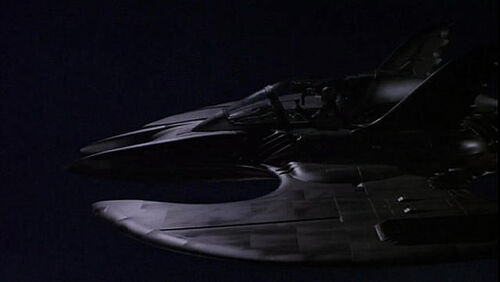 Another great thing about the Batman universe is the amount of interesting gadgets, "those wonderful toys" as the Joker calls them, that both Batman and the villains have at their disposal. My favorite one by far in this movie is the Batmobile. I know the Batmobile existed in various forms before this movie and there have been other interpretations since but, to me, the vehicle in this movie is Batman's car. The way the thing looks just appeals to me, with its long, sleek, black appearance, bat-shaped fins on the rear, the sliding horizontal "door" on its top, and the turbine on the front which undoubtedly powers the engine. It also has plenty of built-in gadgets like machine guns in each fender, a grappling hook for making sharp turns, bombs that can be dropped from the sides, voice-activated shields that protect it from being tampered with, and the ability to drive itself through remote control. It's just a really cool vehicle and I personally think should not have been changed throughout the rest of the series. The other vehicle that Batman uses in this film is the Batwing, which is a modernized version of the previously dubbed "Batplane." It's basically a flying machine designed to look like a three-dimensional version of the Bat-symbol on Batman's chest-plate. It doesn't seem to have many unique gadgets, just a targeting computer (which apparently sucks) for shooting dual machine guns and rockets planted within its sides as well as a mechanism in the nose that can grab onto ropes and cut them.
Another great thing about the Batman universe is the amount of interesting gadgets, "those wonderful toys" as the Joker calls them, that both Batman and the villains have at their disposal. My favorite one by far in this movie is the Batmobile. I know the Batmobile existed in various forms before this movie and there have been other interpretations since but, to me, the vehicle in this movie is Batman's car. The way the thing looks just appeals to me, with its long, sleek, black appearance, bat-shaped fins on the rear, the sliding horizontal "door" on its top, and the turbine on the front which undoubtedly powers the engine. It also has plenty of built-in gadgets like machine guns in each fender, a grappling hook for making sharp turns, bombs that can be dropped from the sides, voice-activated shields that protect it from being tampered with, and the ability to drive itself through remote control. It's just a really cool vehicle and I personally think should not have been changed throughout the rest of the series. The other vehicle that Batman uses in this film is the Batwing, which is a modernized version of the previously dubbed "Batplane." It's basically a flying machine designed to look like a three-dimensional version of the Bat-symbol on Batman's chest-plate. It doesn't seem to have many unique gadgets, just a targeting computer (which apparently sucks) for shooting dual machine guns and rockets planted within its sides as well as a mechanism in the nose that can grab onto ropes and cut them.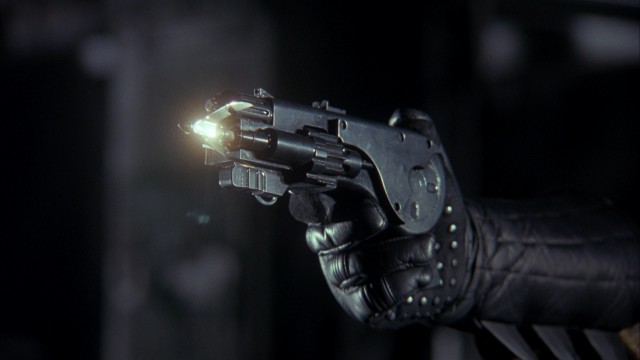



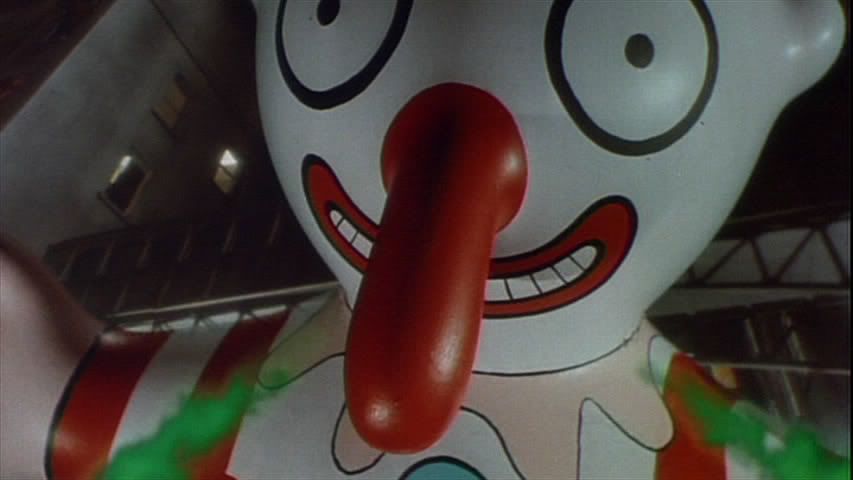 It's interesting to think that it was this film that introduced the idea of Batman having a grappling gun, which has now become a big part of the character in comics and other media. He not only uses it as a tool to ascend and descend but he can also use it as a weapon and deterrent, as in the scene in the Axis Chemical plant where he shoots that one guy and then hangs him over the railing. He also has the classic Batarangs, which he uses to hit as well as tie up criminals' legs, as in the scene where he deals with the muggers on the rooftop; pellets that he throws on the ground that create a lot of mist so he can enter and exit places without being captured or detected; when he saves Vicki Vale from the Joker at the museum, he uses a gun that creates a long zip-line across the length of the interior of the building so he and Vicki can slide safely to the front door; and one gadget that I've never been clear on, which he uses when he first enters the top of the cathedral and one of the Joker's goons comes jumping towards him. He deploys a spring-looking thing out of his glove that the goon hits and either knocks him out or kills him. Ever since I was a kid, I have never figured out what that thing was. It doesn't help that the scene is very dark so, making whatever it is hard to make out. The Joker also has some interesting toys as well. He doesn't have a vehicle except for a helicopter that has his colors and an image of his face painted on it. There are also an assortment of interesting looking balloons and floats that he uses during the parade sequence. Some of those balloons do look pretty original, particularly that one looks like a clown with a long, carrot-like nose. Besides the deadly laughing gas that he employs, he also an assortment of guns, from a very tiny one that he pulls on Bruce Wayne to a ridiculously long one that he pulls out of his trousers which is powerful enough to take down the Batwing and whose barrel can be pushed down to a normal size. There's also that aforementioned deadly hand-buzzer that can fry someone to a crisp, a quill pen that is sharp enough to pierce a guy's neck, a spring-activated boxing glove that he uses to destroy a television, and a flower-squirter in his suit that sprays a powerful acid. He also has an assortment of typical gag toys like a party tooter, chattering teeth, fake glasses, and even a fake hand that he uses to trick Vicki Vale into grabbing onto.
It's interesting to think that it was this film that introduced the idea of Batman having a grappling gun, which has now become a big part of the character in comics and other media. He not only uses it as a tool to ascend and descend but he can also use it as a weapon and deterrent, as in the scene in the Axis Chemical plant where he shoots that one guy and then hangs him over the railing. He also has the classic Batarangs, which he uses to hit as well as tie up criminals' legs, as in the scene where he deals with the muggers on the rooftop; pellets that he throws on the ground that create a lot of mist so he can enter and exit places without being captured or detected; when he saves Vicki Vale from the Joker at the museum, he uses a gun that creates a long zip-line across the length of the interior of the building so he and Vicki can slide safely to the front door; and one gadget that I've never been clear on, which he uses when he first enters the top of the cathedral and one of the Joker's goons comes jumping towards him. He deploys a spring-looking thing out of his glove that the goon hits and either knocks him out or kills him. Ever since I was a kid, I have never figured out what that thing was. It doesn't help that the scene is very dark so, making whatever it is hard to make out. The Joker also has some interesting toys as well. He doesn't have a vehicle except for a helicopter that has his colors and an image of his face painted on it. There are also an assortment of interesting looking balloons and floats that he uses during the parade sequence. Some of those balloons do look pretty original, particularly that one looks like a clown with a long, carrot-like nose. Besides the deadly laughing gas that he employs, he also an assortment of guns, from a very tiny one that he pulls on Bruce Wayne to a ridiculously long one that he pulls out of his trousers which is powerful enough to take down the Batwing and whose barrel can be pushed down to a normal size. There's also that aforementioned deadly hand-buzzer that can fry someone to a crisp, a quill pen that is sharp enough to pierce a guy's neck, a spring-activated boxing glove that he uses to destroy a television, and a flower-squirter in his suit that sprays a powerful acid. He also has an assortment of typical gag toys like a party tooter, chattering teeth, fake glasses, and even a fake hand that he uses to trick Vicki Vale into grabbing onto. 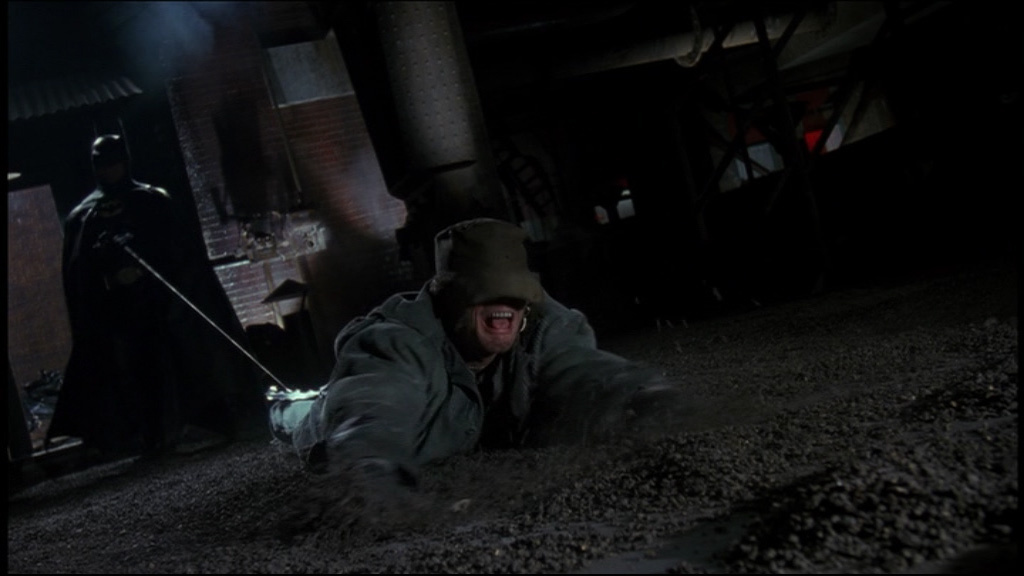
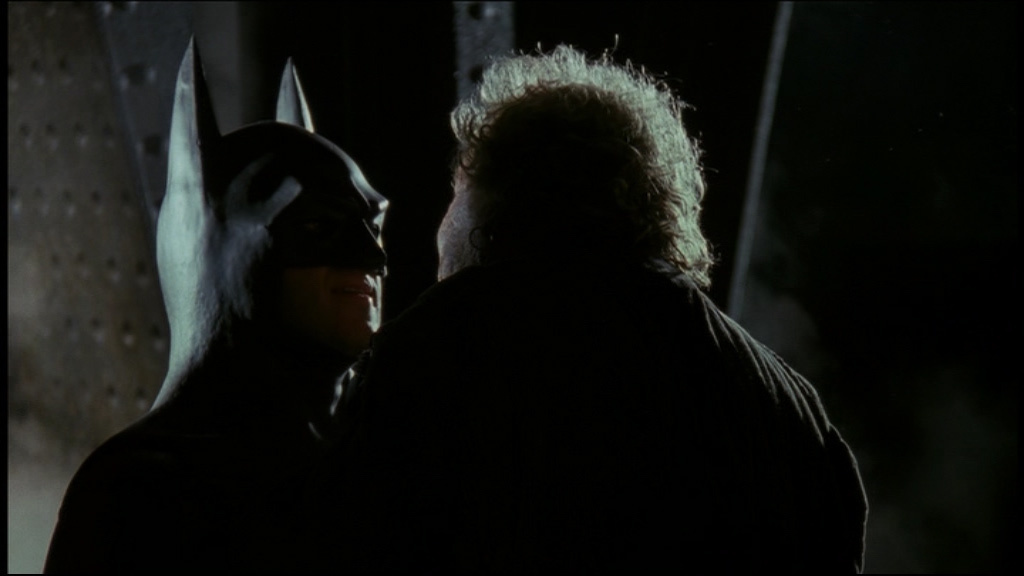
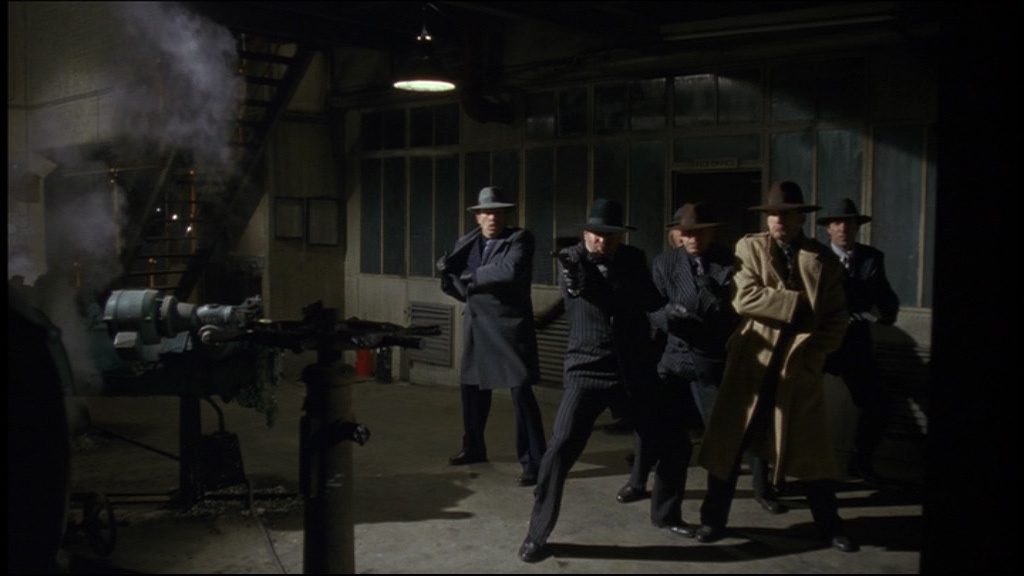
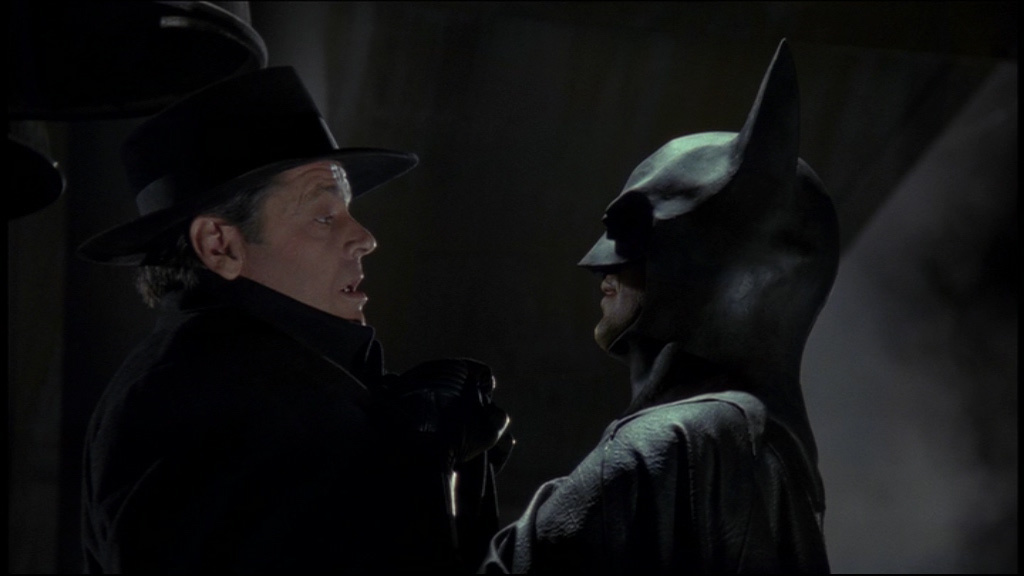
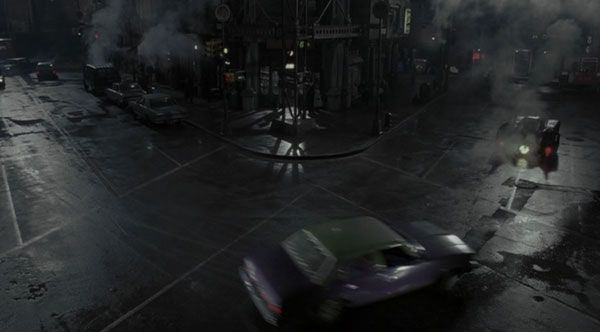




-large-picture.jpg) The last act of the movie has a lot of great action, starting with the Batmobile charging into the Axis Chemicals plant, smashing through all of its various barriers while being pursued and shot at by the Joker's men, and ultimately, blowing the entire place up. That second bit with the Batmobile racing out of the exploding building is just breathtaking and awe-inspiring to watch. After that, you have Batman using the Batwing to destroy the Joker's deadly parade. He swoops down, ties up the ropes of the enormous balloons that are spraying the laughing gas onto the crowd, flies out of the city, and cuts the ropes, making the balloons float away harmlessly into the night sky. While this is going on, Alexander Knox decides to be a hero by trying to stop the Joker's men who are holding the ropes of the balloons, leading to a comical bit where he accidentally lands on his car's windshield while Vicki is driving it and gets flung into a bunch of trash in an alleyway. After the Joker's balloons are discarded, his men turn on the crowd, creating an image of a bunch of panicked people running down the streets. This is when Batman flies downwards towards the floats and finishes his job by destroying them with his machine guns and missiles. He eventually targets the Joker with his targeting computer but misses for some reason (which I'll expand on presently). The Joker then shoots him down with that enormous gun, causing the Batwing to crash in front of the Gotham City Cathedral. The Joker captures Vicki Vale and takes her up to the top of the cathedral to wait for his helicopter but Batman, injured in the crash but still going, follows them up there. This leads to him confronting three more of the Joker's men (I won't even question how they got up there or knew their boss would be there), two of which he dispatches easily but the third proving to be quite a challenge. This big black guy totally dominates Batman, flinging a detached rope and pulley at him and also punching and kicking the living daylights out of him. I don't know why the Joker didn't use this guy beforehand! Batman eventually defeats him by hanging on underneath the ledge where one of the bells is, swings his legs upward, grabs the guy's head with them, and slams him into the bell, causing him to fall to his death. After that, Batman beats up the Joker, who doesn't put up a fight at all, punching Batman in the torso only to hurt his hand on the hard body armor. Eventually, he manages to pull Batman and Vicki over the edge of the cathedral, forcing them to hang there with a lethal drop right below them. The whole time, the Joker is just taunting them by stomping on the loose bricks of the edge, all the while laughing crazily and shaking his butt at them at one point. However, when he tries to escape by climbing up the rope ladder dangling from his helicopter, Batman shoots his leg with a wire that ties it to one of the statues on the side of the cathedral. The statue breaks loose and the weight of it slowly pulls the Joker down the ladder, eventually causing him to fall to his death. Batman and Vicki then try to climb back up onto the ledge but the piece they're holding onto breaks off and Batman quickly fires his grappling gun, which latches onto the inside of the building and catches them both.
The last act of the movie has a lot of great action, starting with the Batmobile charging into the Axis Chemicals plant, smashing through all of its various barriers while being pursued and shot at by the Joker's men, and ultimately, blowing the entire place up. That second bit with the Batmobile racing out of the exploding building is just breathtaking and awe-inspiring to watch. After that, you have Batman using the Batwing to destroy the Joker's deadly parade. He swoops down, ties up the ropes of the enormous balloons that are spraying the laughing gas onto the crowd, flies out of the city, and cuts the ropes, making the balloons float away harmlessly into the night sky. While this is going on, Alexander Knox decides to be a hero by trying to stop the Joker's men who are holding the ropes of the balloons, leading to a comical bit where he accidentally lands on his car's windshield while Vicki is driving it and gets flung into a bunch of trash in an alleyway. After the Joker's balloons are discarded, his men turn on the crowd, creating an image of a bunch of panicked people running down the streets. This is when Batman flies downwards towards the floats and finishes his job by destroying them with his machine guns and missiles. He eventually targets the Joker with his targeting computer but misses for some reason (which I'll expand on presently). The Joker then shoots him down with that enormous gun, causing the Batwing to crash in front of the Gotham City Cathedral. The Joker captures Vicki Vale and takes her up to the top of the cathedral to wait for his helicopter but Batman, injured in the crash but still going, follows them up there. This leads to him confronting three more of the Joker's men (I won't even question how they got up there or knew their boss would be there), two of which he dispatches easily but the third proving to be quite a challenge. This big black guy totally dominates Batman, flinging a detached rope and pulley at him and also punching and kicking the living daylights out of him. I don't know why the Joker didn't use this guy beforehand! Batman eventually defeats him by hanging on underneath the ledge where one of the bells is, swings his legs upward, grabs the guy's head with them, and slams him into the bell, causing him to fall to his death. After that, Batman beats up the Joker, who doesn't put up a fight at all, punching Batman in the torso only to hurt his hand on the hard body armor. Eventually, he manages to pull Batman and Vicki over the edge of the cathedral, forcing them to hang there with a lethal drop right below them. The whole time, the Joker is just taunting them by stomping on the loose bricks of the edge, all the while laughing crazily and shaking his butt at them at one point. However, when he tries to escape by climbing up the rope ladder dangling from his helicopter, Batman shoots his leg with a wire that ties it to one of the statues on the side of the cathedral. The statue breaks loose and the weight of it slowly pulls the Joker down the ladder, eventually causing him to fall to his death. Batman and Vicki then try to climb back up onto the ledge but the piece they're holding onto breaks off and Batman quickly fires his grappling gun, which latches onto the inside of the building and catches them both.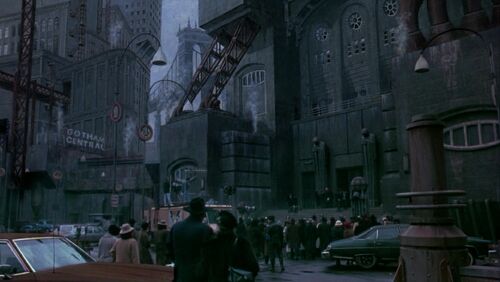
 The effects work in Batman is still pretty solid even today in my opinion. A lot of it is optical and modelwork and for the most part, you can't tell where something is fake. Gotham City looks like a real city not only when you're in the interior but also when you see it from the outside, like in the very first shot of the movie or when the Batwing flies toward it. The modelwork of the vehicles is also very solid and so is that of the buildings. If I have to nitpick, though, during the quick pan upwards at Carl Grissom's building early in the film, it is a bit obvious that it is a model (I thought the cathedral model looked awesome, though). The Batmobile's shields are also pretty dated in how they are obviously animated over the actual model but it's not distracting. Finally, the optical work during the climax with Batman, the Joker, and Vicki on the edge of the cathedral is a bit wonky, with the Joker's coat changing from purple in the closeups to red in the wide-shots were there's optical work. There are some quirks here and there but not enough to distract me from how awesome the movie is overall.
The effects work in Batman is still pretty solid even today in my opinion. A lot of it is optical and modelwork and for the most part, you can't tell where something is fake. Gotham City looks like a real city not only when you're in the interior but also when you see it from the outside, like in the very first shot of the movie or when the Batwing flies toward it. The modelwork of the vehicles is also very solid and so is that of the buildings. If I have to nitpick, though, during the quick pan upwards at Carl Grissom's building early in the film, it is a bit obvious that it is a model (I thought the cathedral model looked awesome, though). The Batmobile's shields are also pretty dated in how they are obviously animated over the actual model but it's not distracting. Finally, the optical work during the climax with Batman, the Joker, and Vicki on the edge of the cathedral is a bit wonky, with the Joker's coat changing from purple in the closeups to red in the wide-shots were there's optical work. There are some quirks here and there but not enough to distract me from how awesome the movie is overall.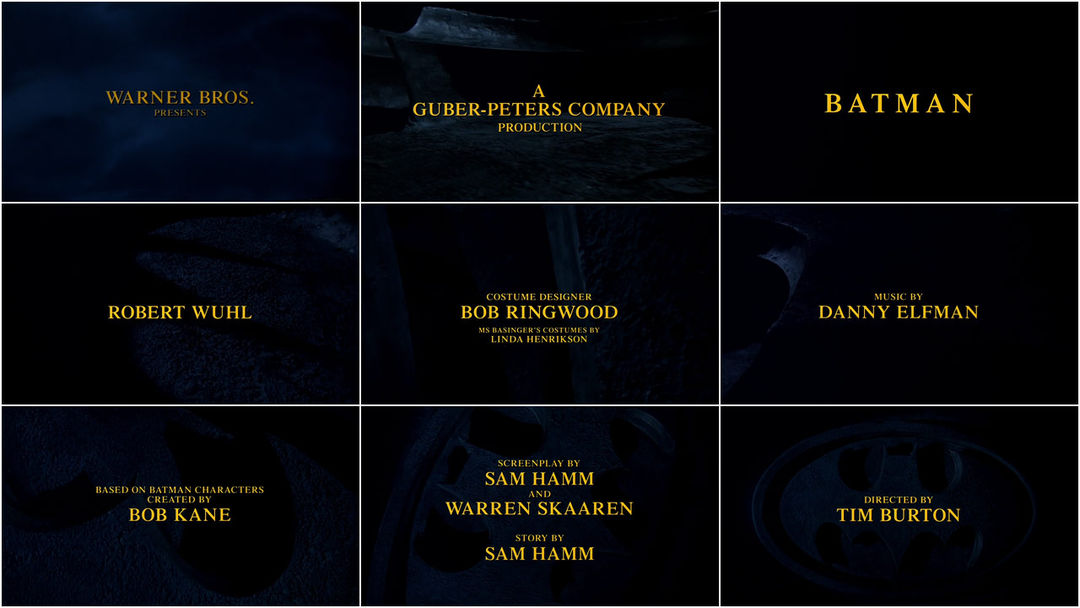

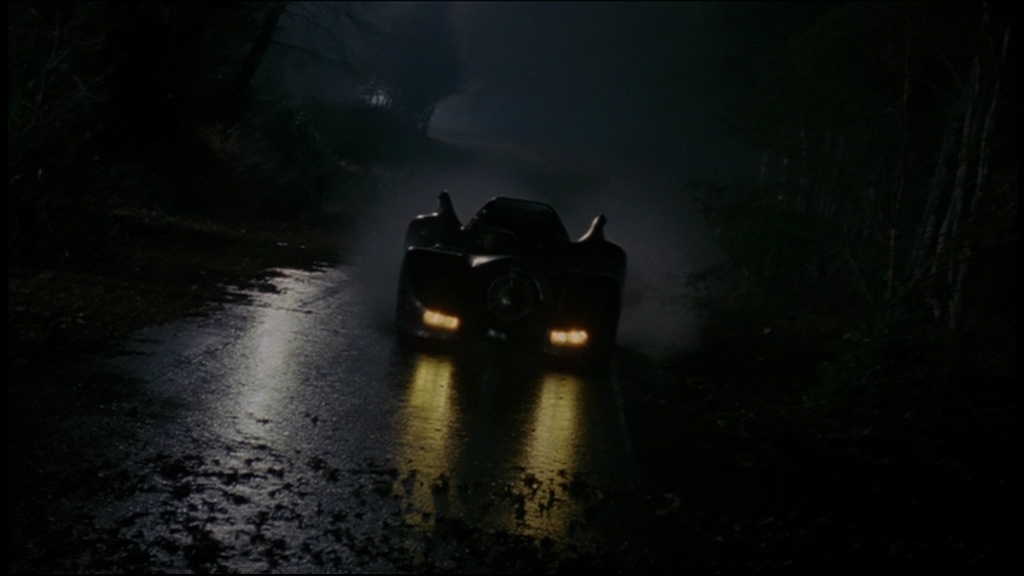

 Besides the action scenes, there are several other moments in the film that I find speak volumes even though they're very brief. One is the opening credits sequence. It's a very interesting and mysterious way to open the movie, with the camera starting on a shot of the night sky and then, panning downward and traveling through an odd, black structure which you'd probably think was the Batcave at first but eventually is revealed to be a stone carving of the Bat symbol. Whatever or wherever it was is never explained but it's a memorable way to open the movie, with the yellow credits and Danny Elfman's theme going full blast. Second is the scene where Batman and Vicki Vale are in the Batmobile, driving through what looks like a sparse forest. Except for one line of dialogue, the scene is entirely silent except for the sound effects and the Elfman score. It has no bearing whatsoever on the plot save for the moment where Vicki starts to recognize what bit of Batman's face she can see behind the mask and you could cut it out without affecting the movie. Still, to me it nicely sums up the mystery of Batman, particularly in this vision of his world as created by Tim Burton, serving as an interesting little bit of mysterious eye candy. Third, there's the moment after Bruce Wayne tells Vicki, "I've gotta go to work," and he opens up the chamber containing the Batman suit. We see him buckle the belt, place the bat symbol over his chest, and then glance upwards in full costume. Not only is it a great, cool moment but if you think about it, that was the last time we saw Bruce; for the rest of the movie, we have his alter ego. I would like to think of this moment as his alter ego becoming front and center, determined to take Gotham City back from the Joker no matter what, leading to him becoming its official protector. There's also an interesting brief moment during the parade sequence where the Batwing flies up into the sky, passes through some clouds, and stops for a brief second in front of the moon, creating an interesting image of the Bat symbol. But for me, the very last shot of the movie sums up the entire Batman character perfectly in one great image. It's that last pan upwards to the rooftops of Gotham, ultimately dissolving to Batman standing on the highest building, with the Bat Signal in the sky behind him, guarding his city as his cape blows in the breeze. It just sums it all up perfectly right there. That's Batman.
Besides the action scenes, there are several other moments in the film that I find speak volumes even though they're very brief. One is the opening credits sequence. It's a very interesting and mysterious way to open the movie, with the camera starting on a shot of the night sky and then, panning downward and traveling through an odd, black structure which you'd probably think was the Batcave at first but eventually is revealed to be a stone carving of the Bat symbol. Whatever or wherever it was is never explained but it's a memorable way to open the movie, with the yellow credits and Danny Elfman's theme going full blast. Second is the scene where Batman and Vicki Vale are in the Batmobile, driving through what looks like a sparse forest. Except for one line of dialogue, the scene is entirely silent except for the sound effects and the Elfman score. It has no bearing whatsoever on the plot save for the moment where Vicki starts to recognize what bit of Batman's face she can see behind the mask and you could cut it out without affecting the movie. Still, to me it nicely sums up the mystery of Batman, particularly in this vision of his world as created by Tim Burton, serving as an interesting little bit of mysterious eye candy. Third, there's the moment after Bruce Wayne tells Vicki, "I've gotta go to work," and he opens up the chamber containing the Batman suit. We see him buckle the belt, place the bat symbol over his chest, and then glance upwards in full costume. Not only is it a great, cool moment but if you think about it, that was the last time we saw Bruce; for the rest of the movie, we have his alter ego. I would like to think of this moment as his alter ego becoming front and center, determined to take Gotham City back from the Joker no matter what, leading to him becoming its official protector. There's also an interesting brief moment during the parade sequence where the Batwing flies up into the sky, passes through some clouds, and stops for a brief second in front of the moon, creating an interesting image of the Bat symbol. But for me, the very last shot of the movie sums up the entire Batman character perfectly in one great image. It's that last pan upwards to the rooftops of Gotham, ultimately dissolving to Batman standing on the highest building, with the Bat Signal in the sky behind him, guarding his city as his cape blows in the breeze. It just sums it all up perfectly right there. That's Batman. 

As great as Tim Burton's work is and as awesome as the performances of the actors and the visuals are, a lot of the emotion that comes from the film wouldn't be there were it not for Danny Elfman's amazing score. Elfman is well-known a frequent colloborator with Burton, having done the scores for nearly all of his movies, and has done many other great scores to boot, but I feel that this is his best work. Every piece of music in this movie just fits the visuals and atmosphere of the film perfectly. Like everything else in the movie, I feel that his main theme for the movie is authentically Batman. Other composers may have written other themes for the character in the following years but I always think of this music when I hear the name Batman. It captures both the adventure and the dark brooding nature of the Batman character to a tee. I actually like the little reprise over the first part of the ending credits even better than the theme that plays during the opening ones. The faster pace and the fact that it comes after Batman has triumphed and is now the protector of Gotham just appeals to me more. There are many other great parts of the score as well. I really like the bit that plays during the Axis Chemicals scene; the section called Descent Into Mystery with Batman and Vicki in the Batmobile; the mysterious soft music that plays during the scene between the two of them in the Batcave; Childhood Remembered when Bruce realizes that Jack Napier killed his parents; Charge of the Batmobile when the Batmobile destroys the Axis Chemicals plant is a particularly rousing, dark bit of music; Attack of the Batwing, which plays during Batman's assault on the Joker's parade floats, is equally thrilling; Up the Cathedral, with Batman following the Joker and Vicki up the steps of the cathedral, is so great in its Gothic feel and sound; The Final Confrontation, which is the last scene leading up to the Joker's death is also dark and fits the images well, particularly when the Joker slowly slips down the helicopter's rope ladder and ultimately plummets to his death; and the Finale that closes the actual movie, starting very slow and soothing as Vicki looks up at the Bat Signal in the sky and then swells to a triumphant orchestra complete with a chiming bell as it shows that great image of Batman on top of the building. I love this score to death and I really hope I get to meet Danny Elfman one day just to tell him how awesome and inspiring he is as a composer.
 If there's one thing most people agree that they hate about Batman's soundtrack, it's the songs by Prince. Tim Burton himself was completely against this idea but Warner Bros. forced him to allow Prince to write a bunch of songs for the movie since Prince was a popular artist at the time. Many feel that these songs horribly date the movie and don't fit with its timeless setting, but, while I can't really deny that, I'd be lying if I said I didn't enjoy the songs that appear in the movie. I know there was an album with a lot of songs that weren't actually in the film, which I haven't listened to, and I do agree that Batdance song and accompanying music video are really stupid, but for the other songs that are in the actual film, I like them. I think Partyman is a fun, upbeat song and fits that scene where the Joker and his goons are trashing the art museum. Trust has a nice sound to it and, again, I like seeing the Joker dancing on a float to it while throwing money at the various people on the street. Finally, there's Scandalous, that song that closes the movie over the last part of the ending credits. It's a slow, soothing song with a nice beat and is a great way to end the movie in an auditory sense. You can kick back and think about all of the great scenes you've seen throughout the movie while listening to it. The song The Future may be in the movie somewhere, perhaps playing on the radio during the opening scene of the movie, but I don't recall anything specific from it. All in all, I don't mind the Prince songs here.
If there's one thing most people agree that they hate about Batman's soundtrack, it's the songs by Prince. Tim Burton himself was completely against this idea but Warner Bros. forced him to allow Prince to write a bunch of songs for the movie since Prince was a popular artist at the time. Many feel that these songs horribly date the movie and don't fit with its timeless setting, but, while I can't really deny that, I'd be lying if I said I didn't enjoy the songs that appear in the movie. I know there was an album with a lot of songs that weren't actually in the film, which I haven't listened to, and I do agree that Batdance song and accompanying music video are really stupid, but for the other songs that are in the actual film, I like them. I think Partyman is a fun, upbeat song and fits that scene where the Joker and his goons are trashing the art museum. Trust has a nice sound to it and, again, I like seeing the Joker dancing on a float to it while throwing money at the various people on the street. Finally, there's Scandalous, that song that closes the movie over the last part of the ending credits. It's a slow, soothing song with a nice beat and is a great way to end the movie in an auditory sense. You can kick back and think about all of the great scenes you've seen throughout the movie while listening to it. The song The Future may be in the movie somewhere, perhaps playing on the radio during the opening scene of the movie, but I don't recall anything specific from it. All in all, I don't mind the Prince songs here. Batman, to me, couldn't have been a better feature film adaptation of the popular superhero at that time. It introduced audiences to a darker, more Gothic take on the story and the world of the character, a quirkier and more emotionally scarred interpretation of Bruce Wayne and his alter ego, a funny but still very creepy version of the Clown Prince of Crime, and a great story of two characters tied together by fate. The music by Danny Elfman fits the visuals and emotions of the film perfectly, the vision of Gotham City is tremendous and memorable, the actors all play their parts well, and, despite the difficulties he faced during production, Tim Burton manages to keep an even, crisp direction. It has some quirks and odd moments that aren't explained, mind you, but I just think it sums up the Batman character in a way that feels perfect and authentic. In conclusion, it not only introduced the modern version of the character to the general public but, for me, along with several other incarnations in film and television that came in its wake around that time, it will always be what immediately comes to mind when I hear the name Batman.
Batman, to me, couldn't have been a better feature film adaptation of the popular superhero at that time. It introduced audiences to a darker, more Gothic take on the story and the world of the character, a quirkier and more emotionally scarred interpretation of Bruce Wayne and his alter ego, a funny but still very creepy version of the Clown Prince of Crime, and a great story of two characters tied together by fate. The music by Danny Elfman fits the visuals and emotions of the film perfectly, the vision of Gotham City is tremendous and memorable, the actors all play their parts well, and, despite the difficulties he faced during production, Tim Burton manages to keep an even, crisp direction. It has some quirks and odd moments that aren't explained, mind you, but I just think it sums up the Batman character in a way that feels perfect and authentic. In conclusion, it not only introduced the modern version of the character to the general public but, for me, along with several other incarnations in film and television that came in its wake around that time, it will always be what immediately comes to mind when I hear the name Batman.
Even though I can't stand the movie myself, you've covered everything here including all the points I would use to say why I didn't like it. Well done.
ReplyDeleteThis is a little bit long for a typical blog post especially without some pictures to break things up. It was easy to read though and not too much of a ramble.
When this film came out I loved it. But going back when it came out on DVD I realized it didn't age well. Jack overacts his ass off as Joker. And not in a good way. The Joker is supposed to be a darkly funny but creepy person. Jack's version of Joker isn't creepy at all. Keaton does a great job as Bruce Wayne but sucks as Batman.
ReplyDeleteI can't help it. I love this flick. I always have and always will.
ReplyDeleteWithout a doubt the most iconic movie of the Batman series considering that it's what made Batman popular again during the late 80's! Add to the fact that it was directed by Tim Burton makes this even more iconic and unforgettable! No other Batman movie can top this one! Not even the Dark Knight movies!
ReplyDeleteWithout a doubt one of if not the best Batman movie ever made considering that it came out in 1989! Add to the fact that it was directed by Tim Burton makes this movie a must-watch to any Batman or superhero fan!
ReplyDelete